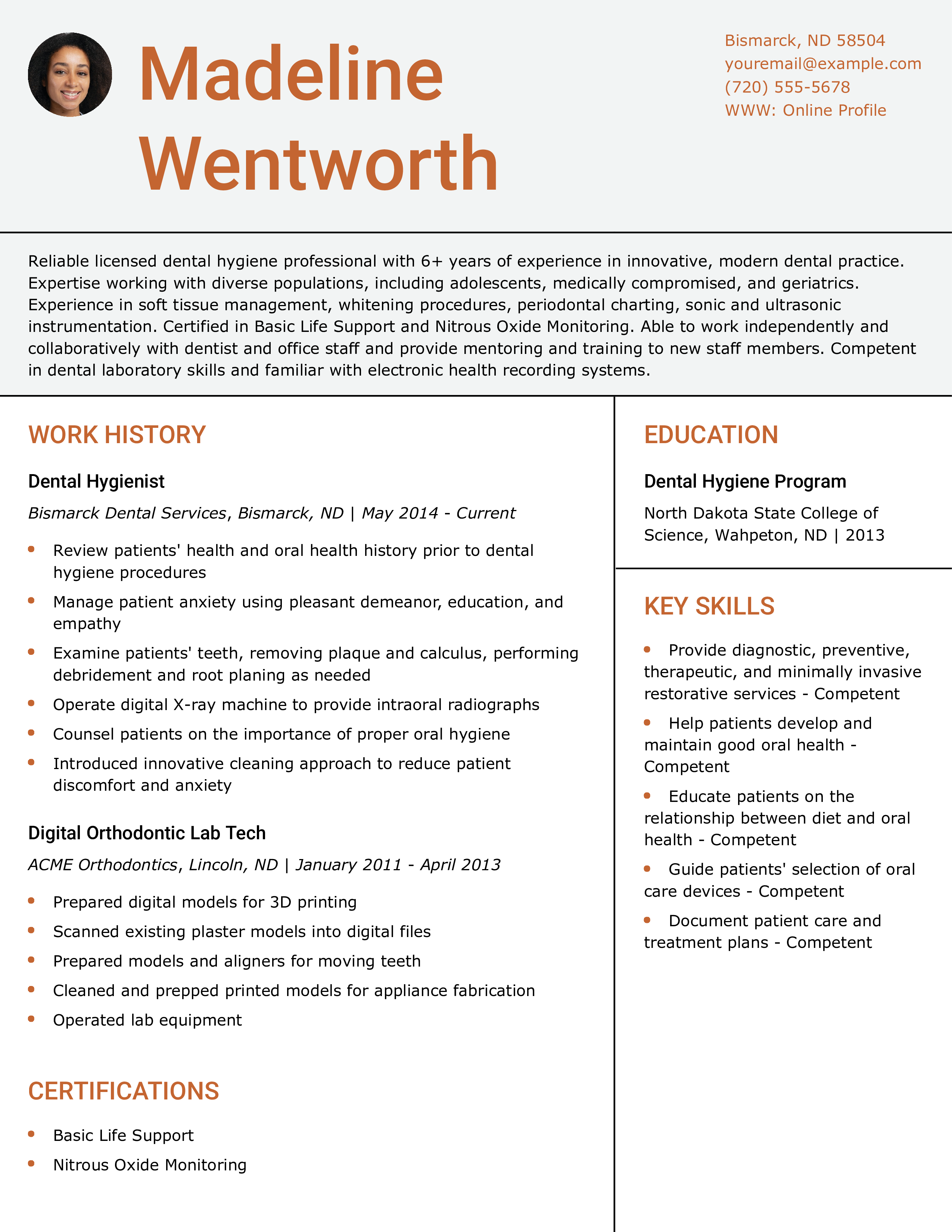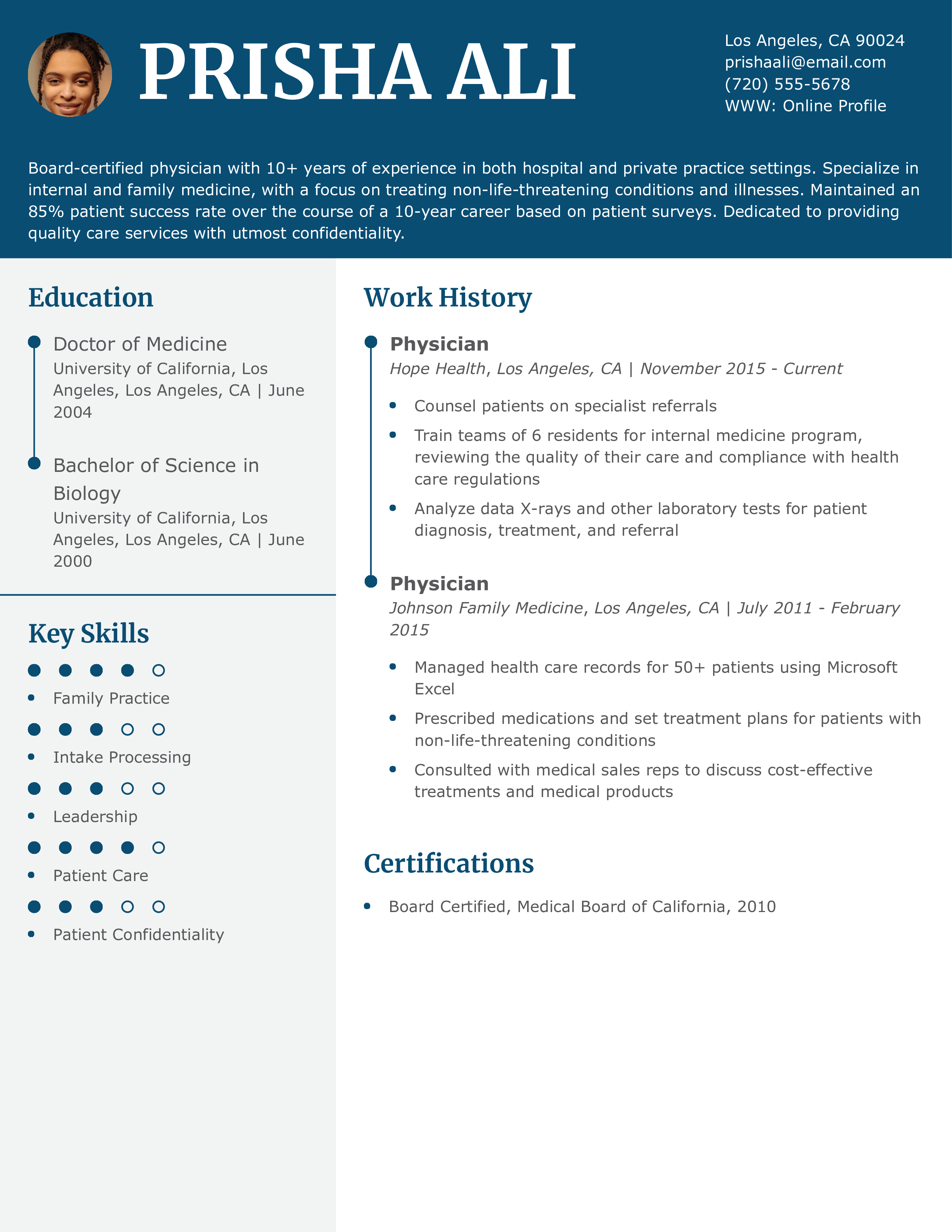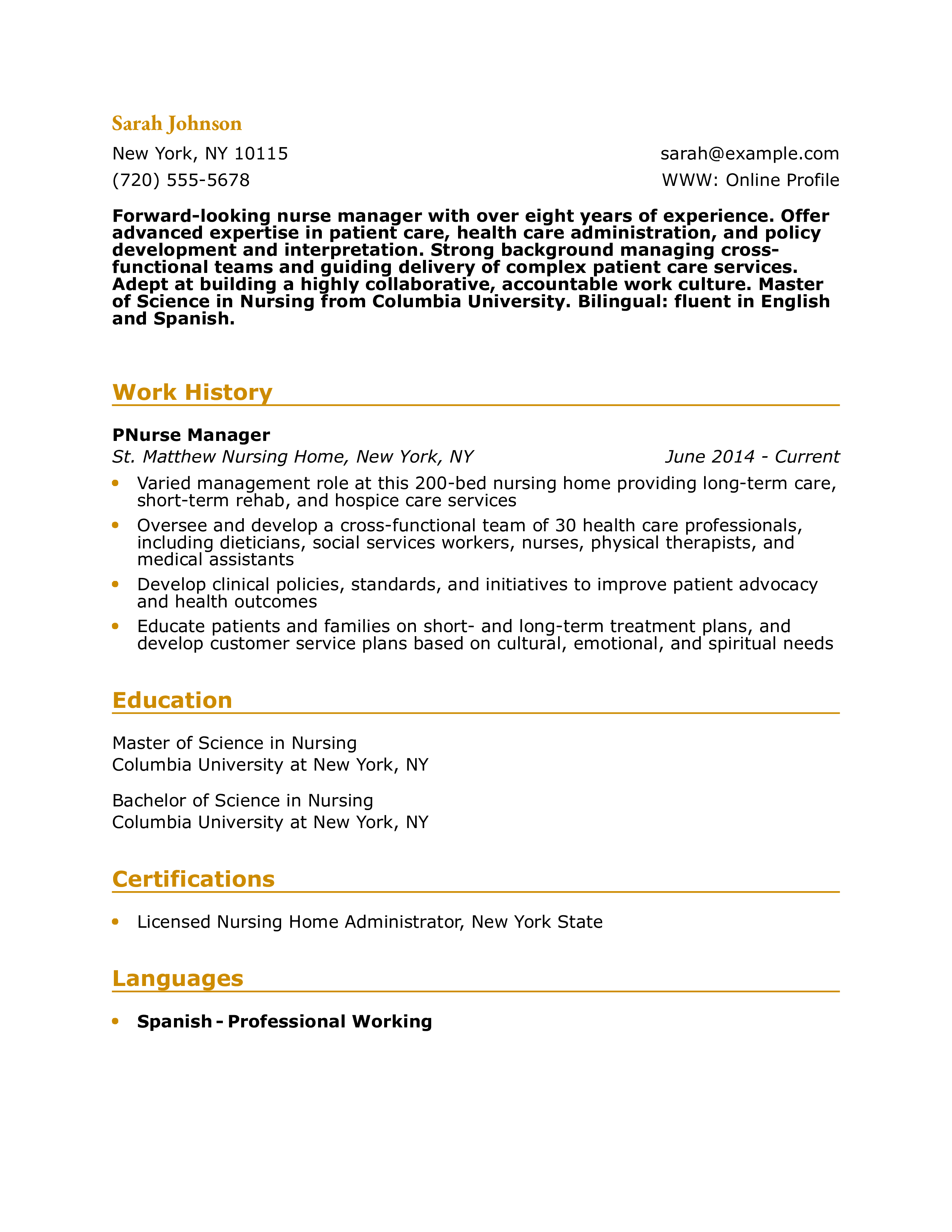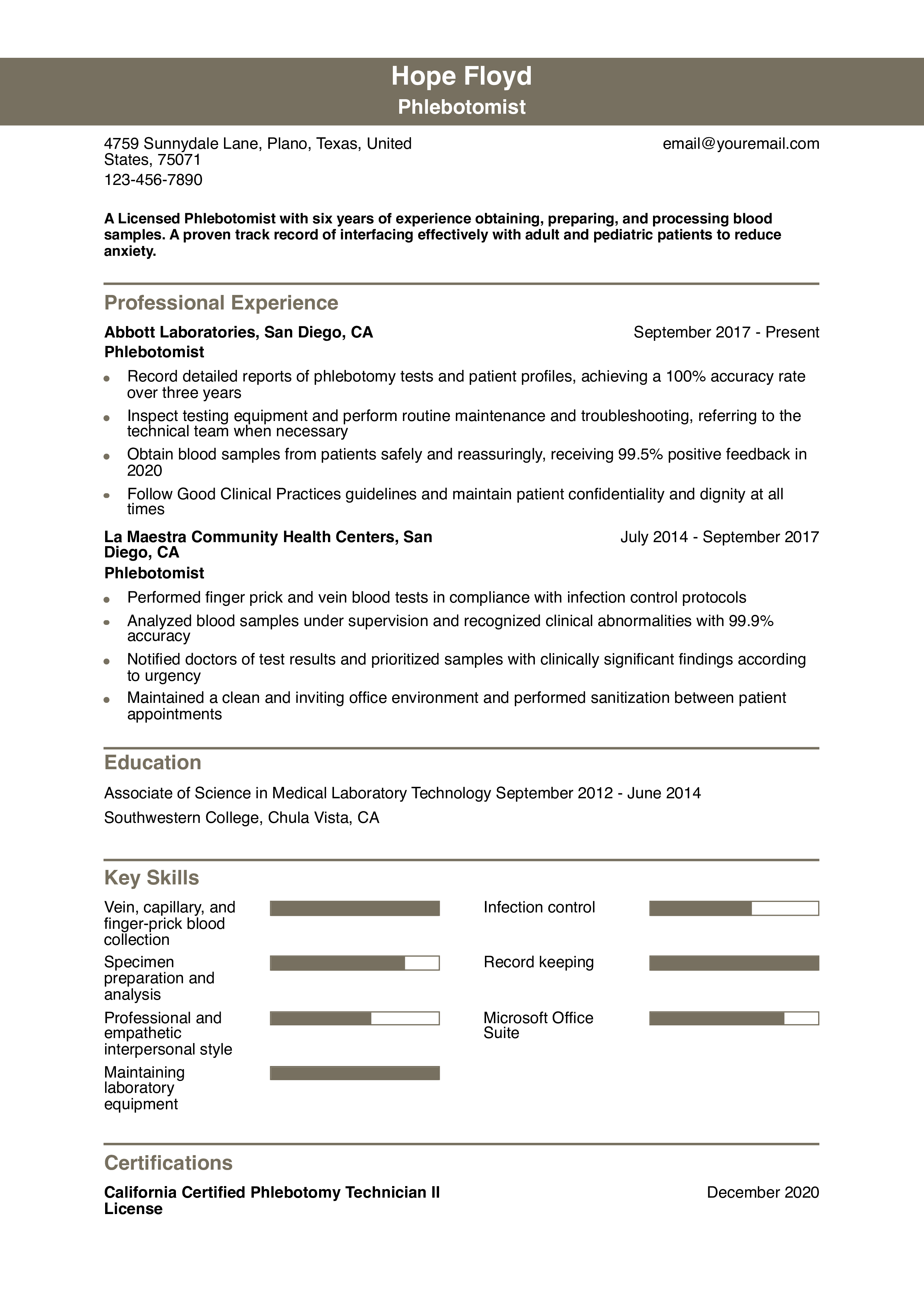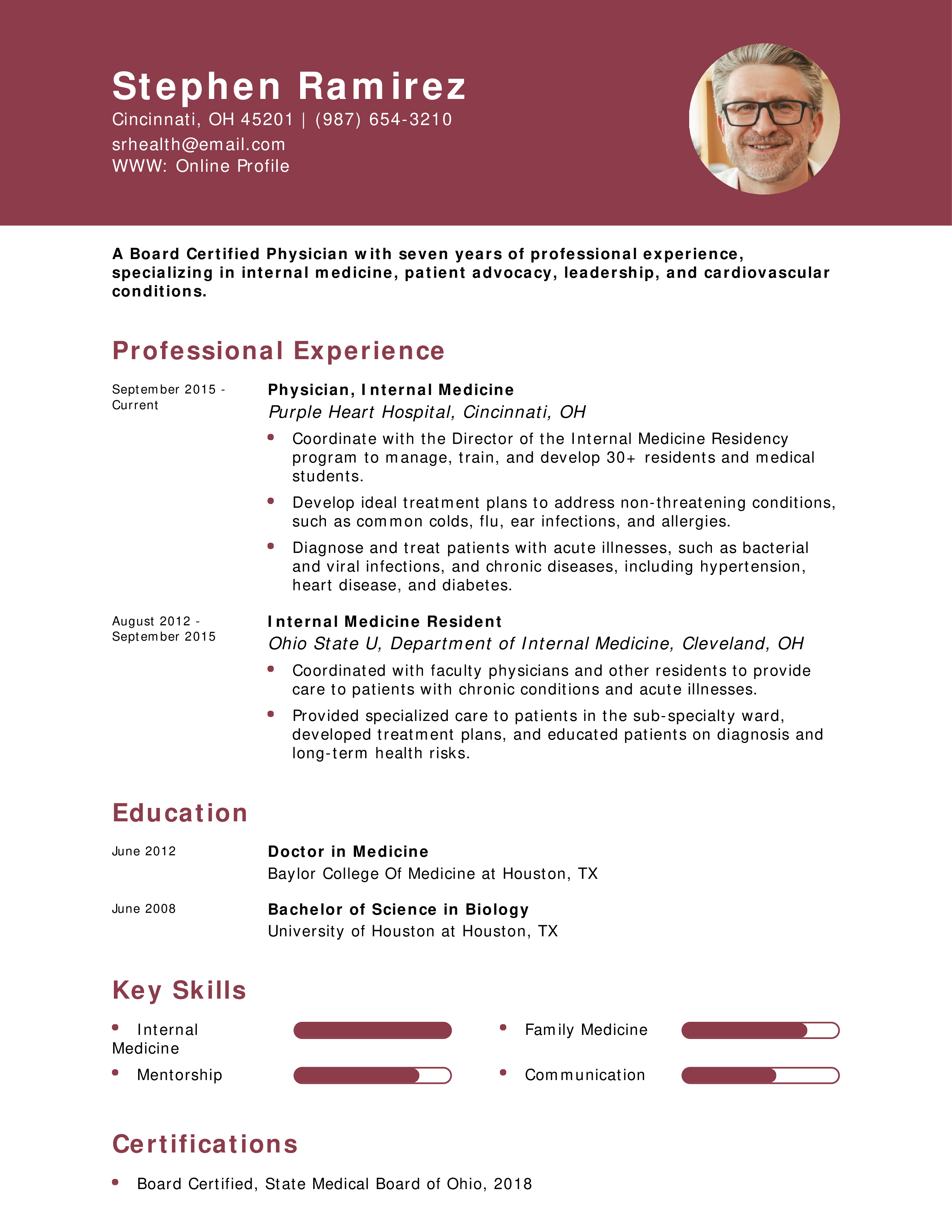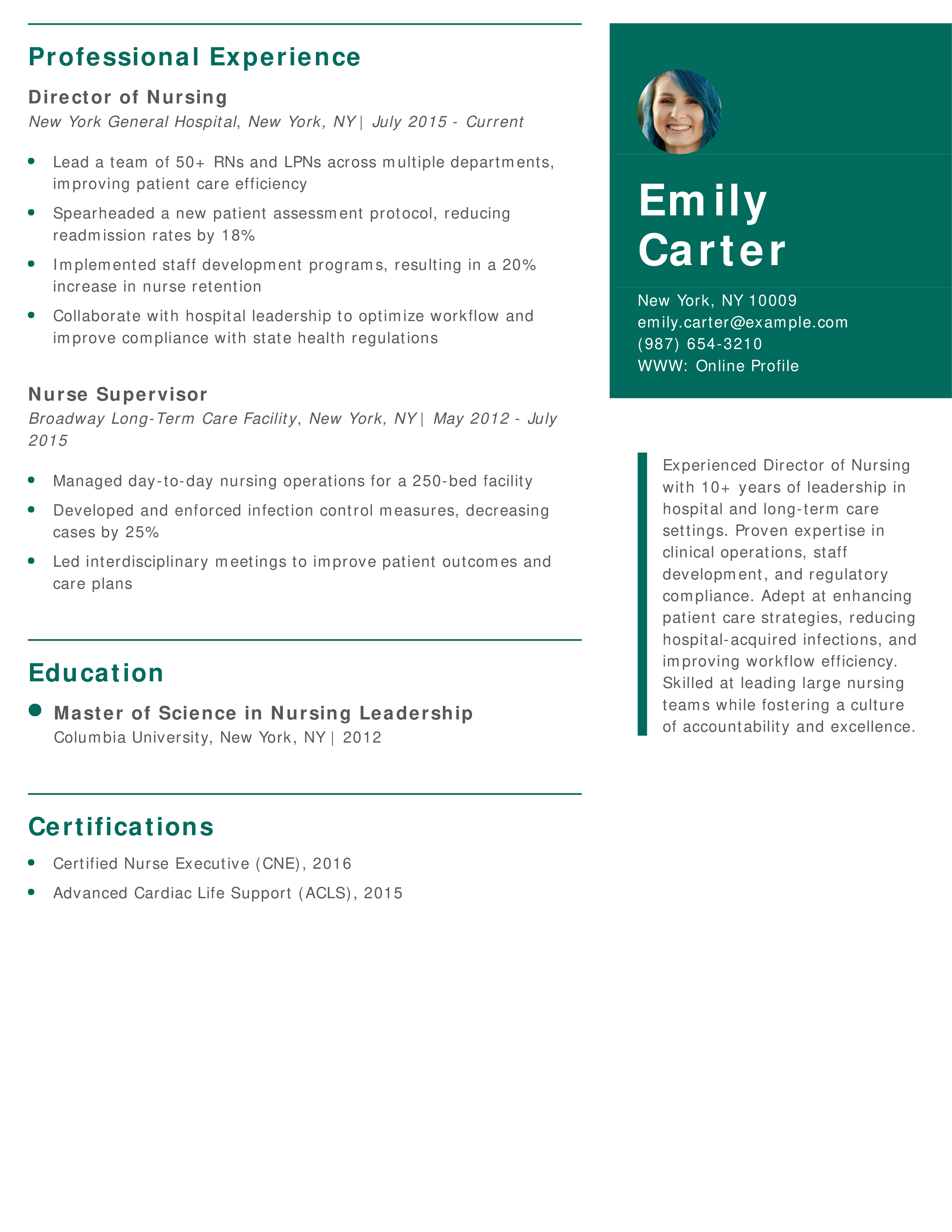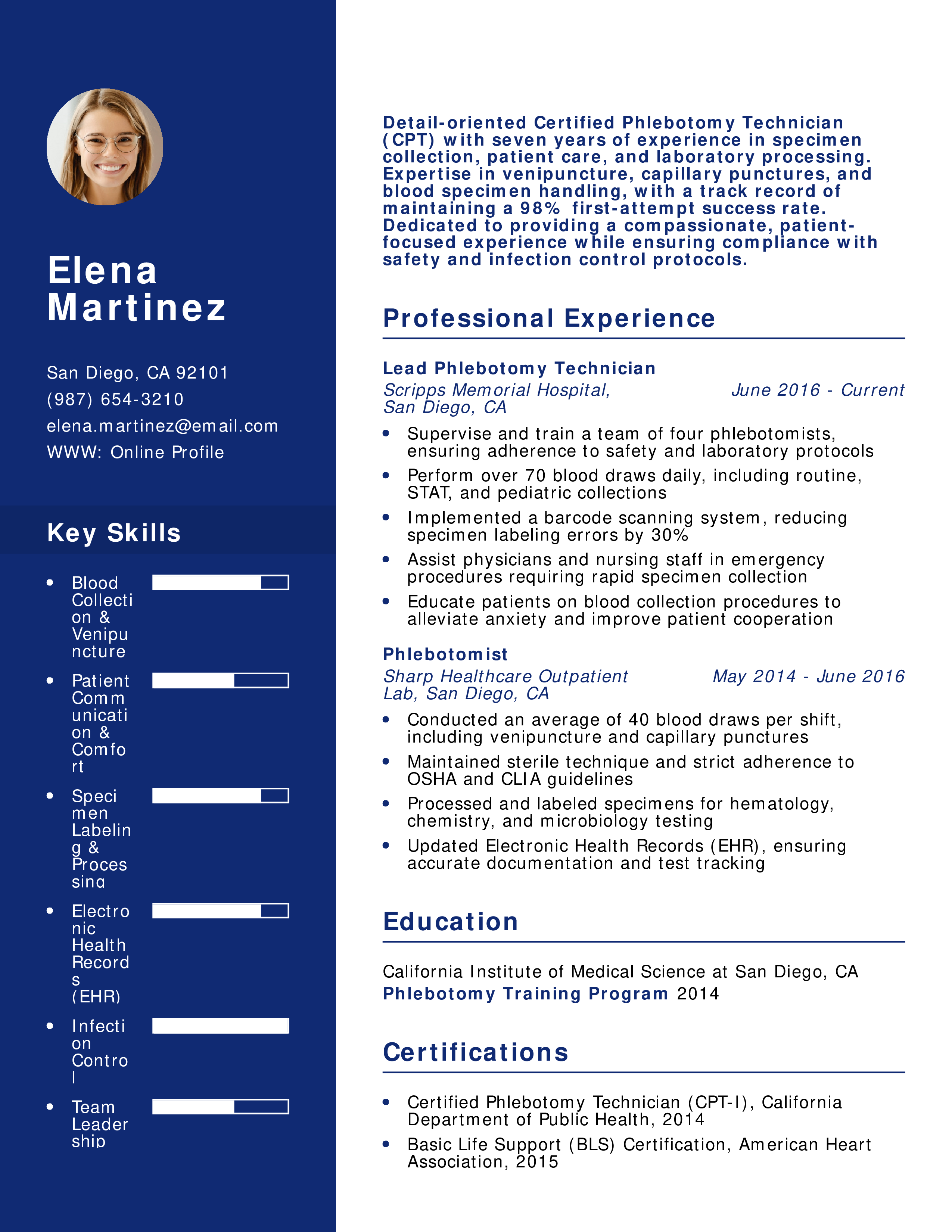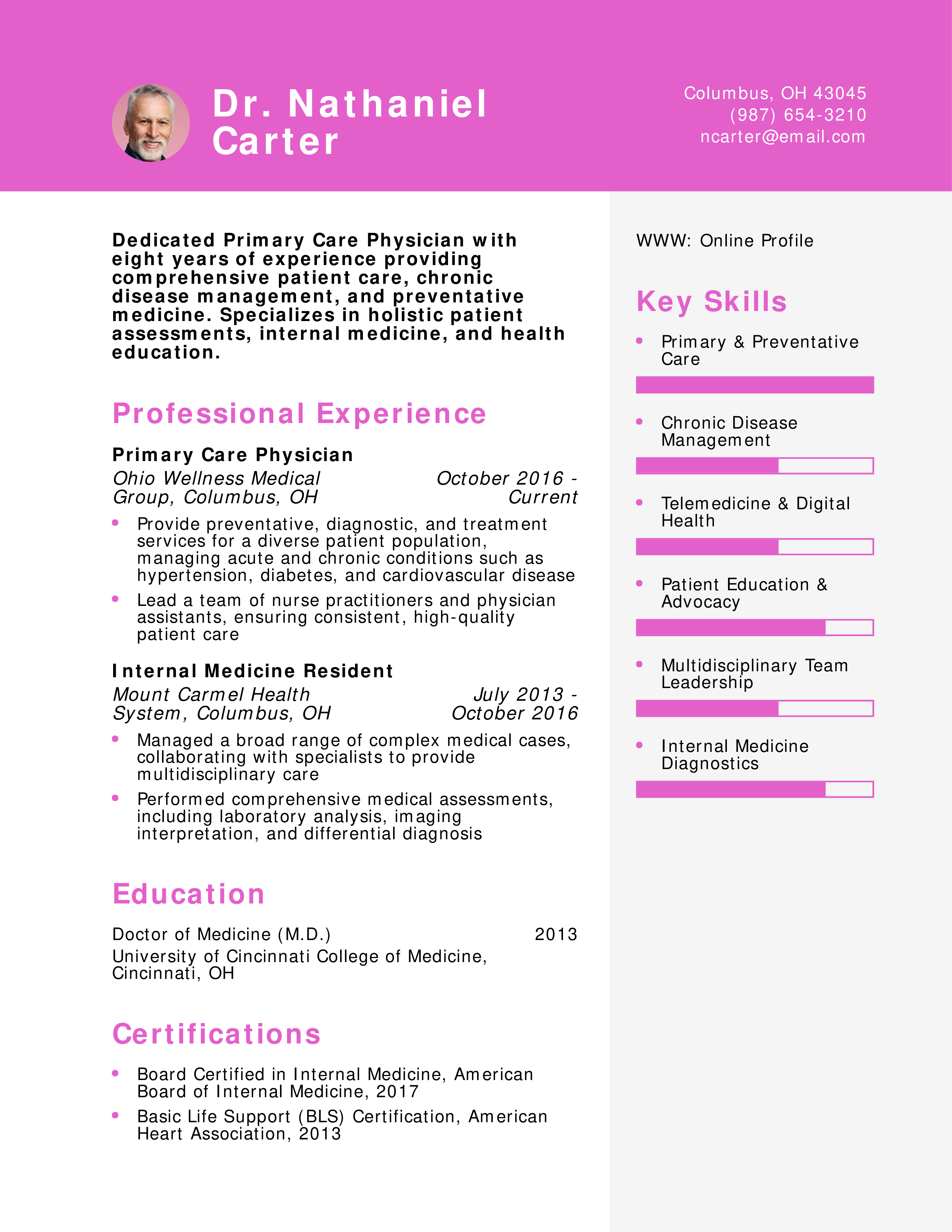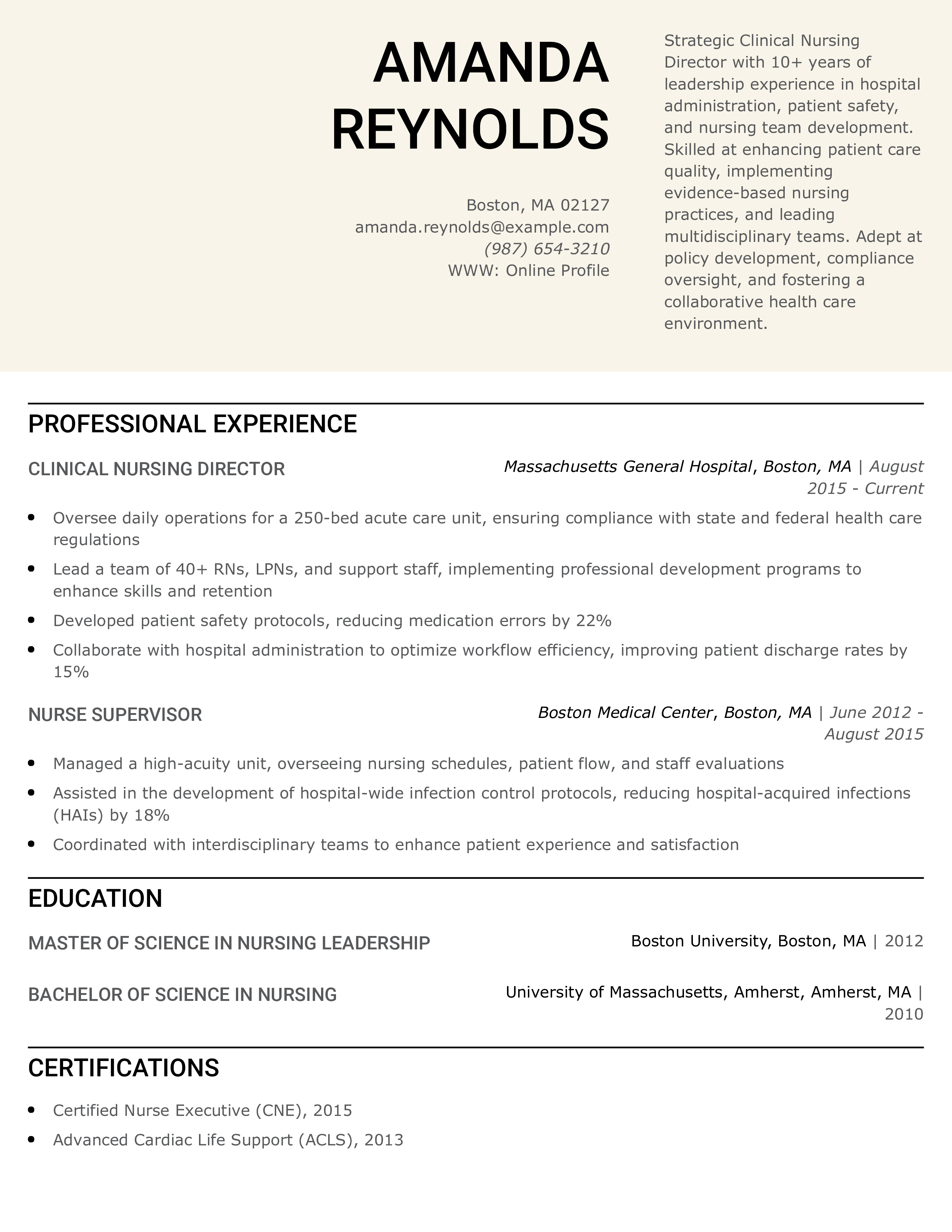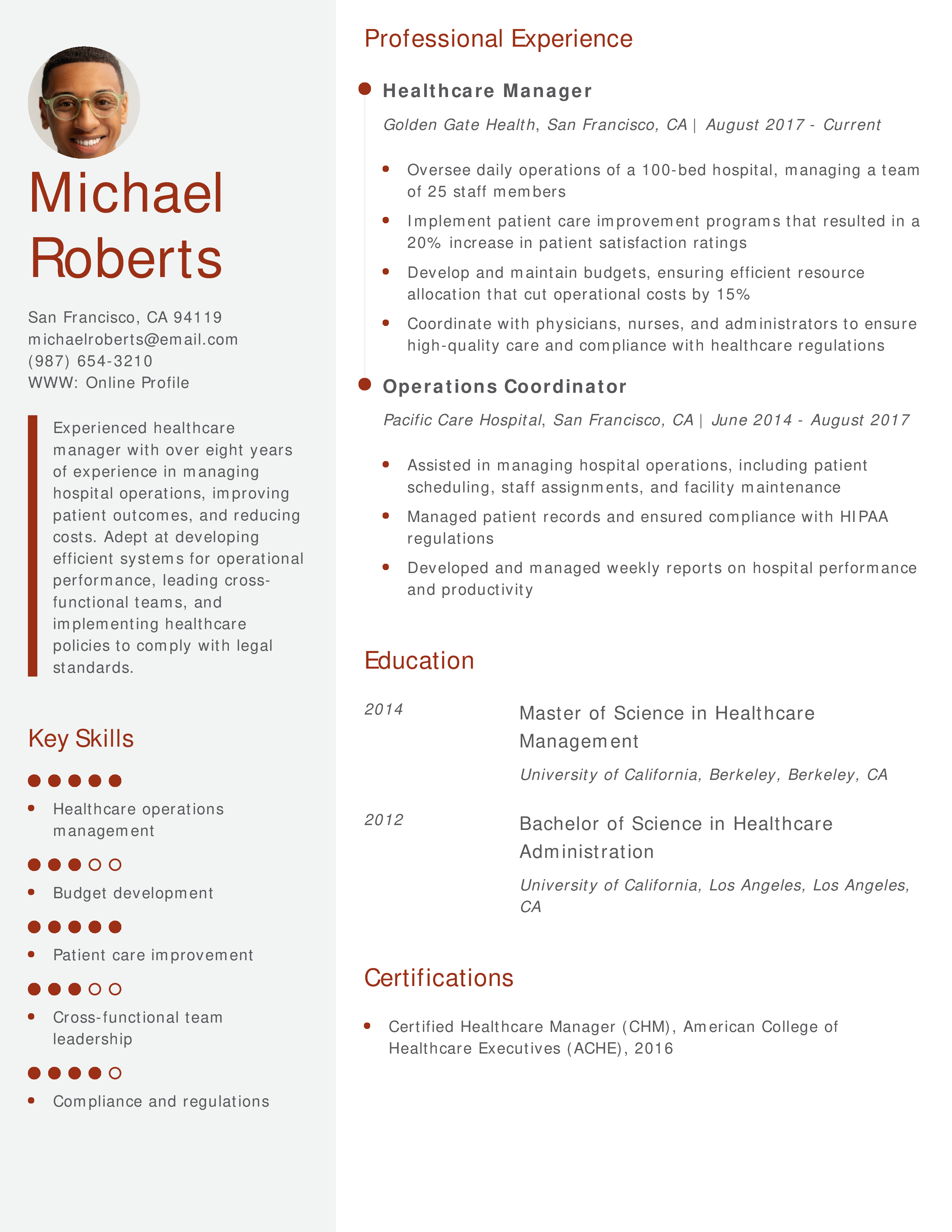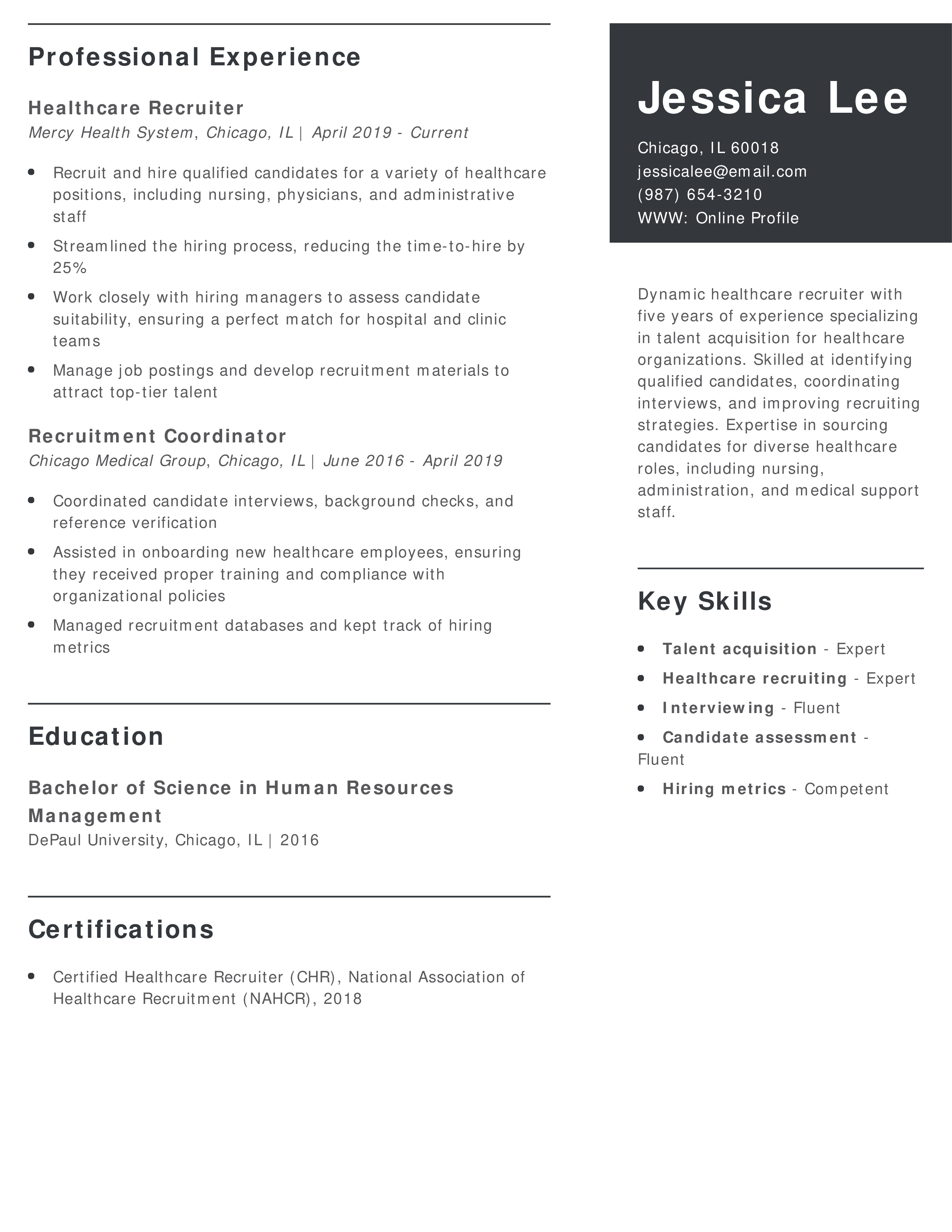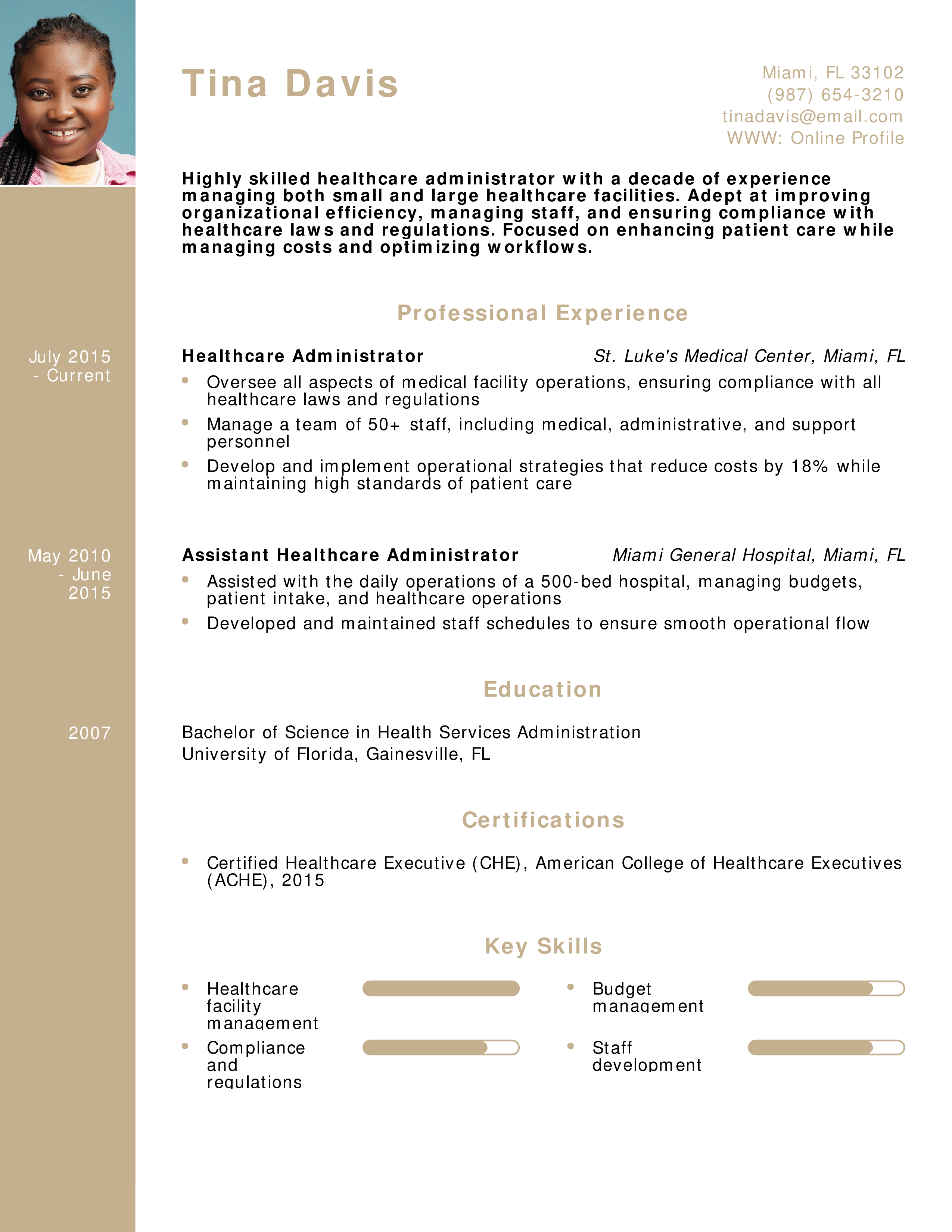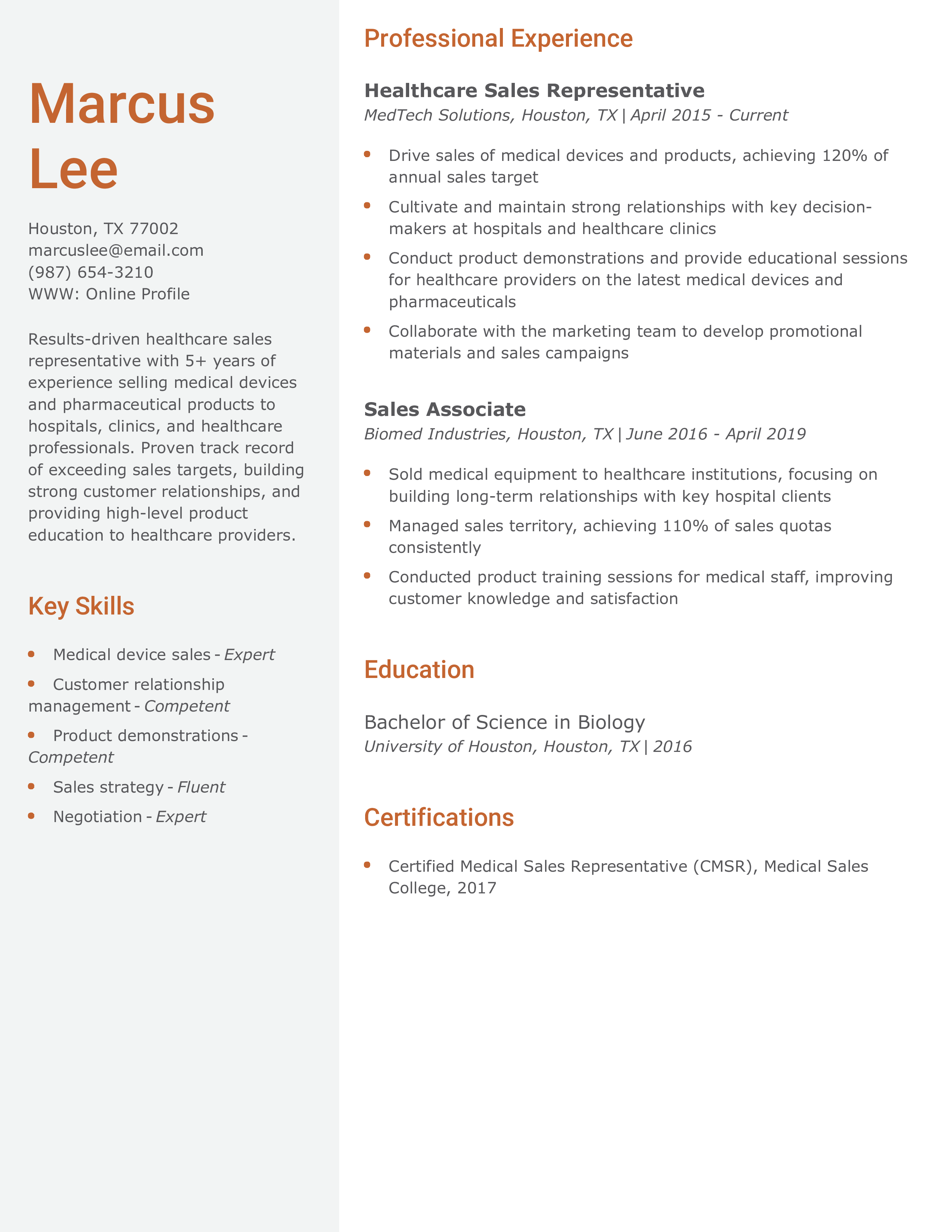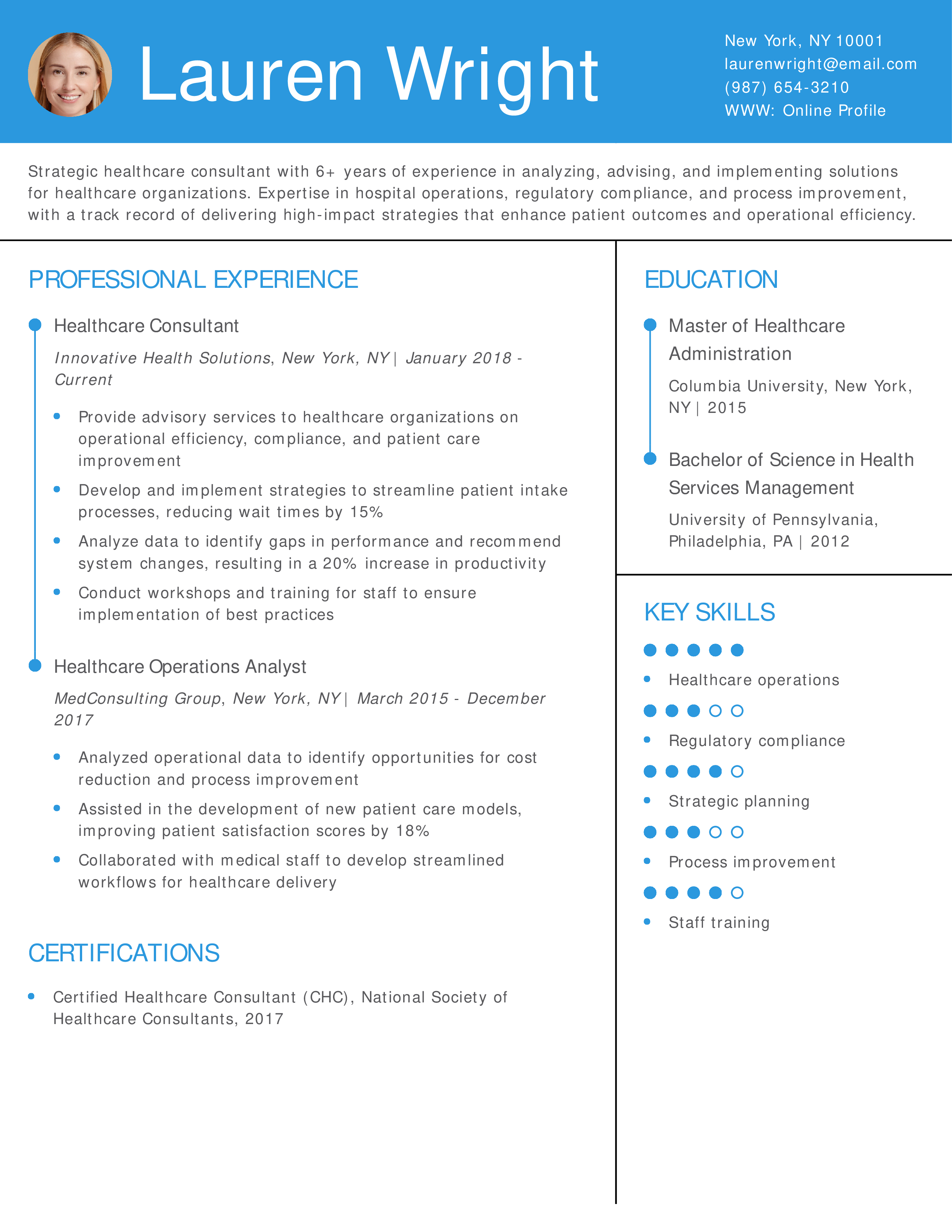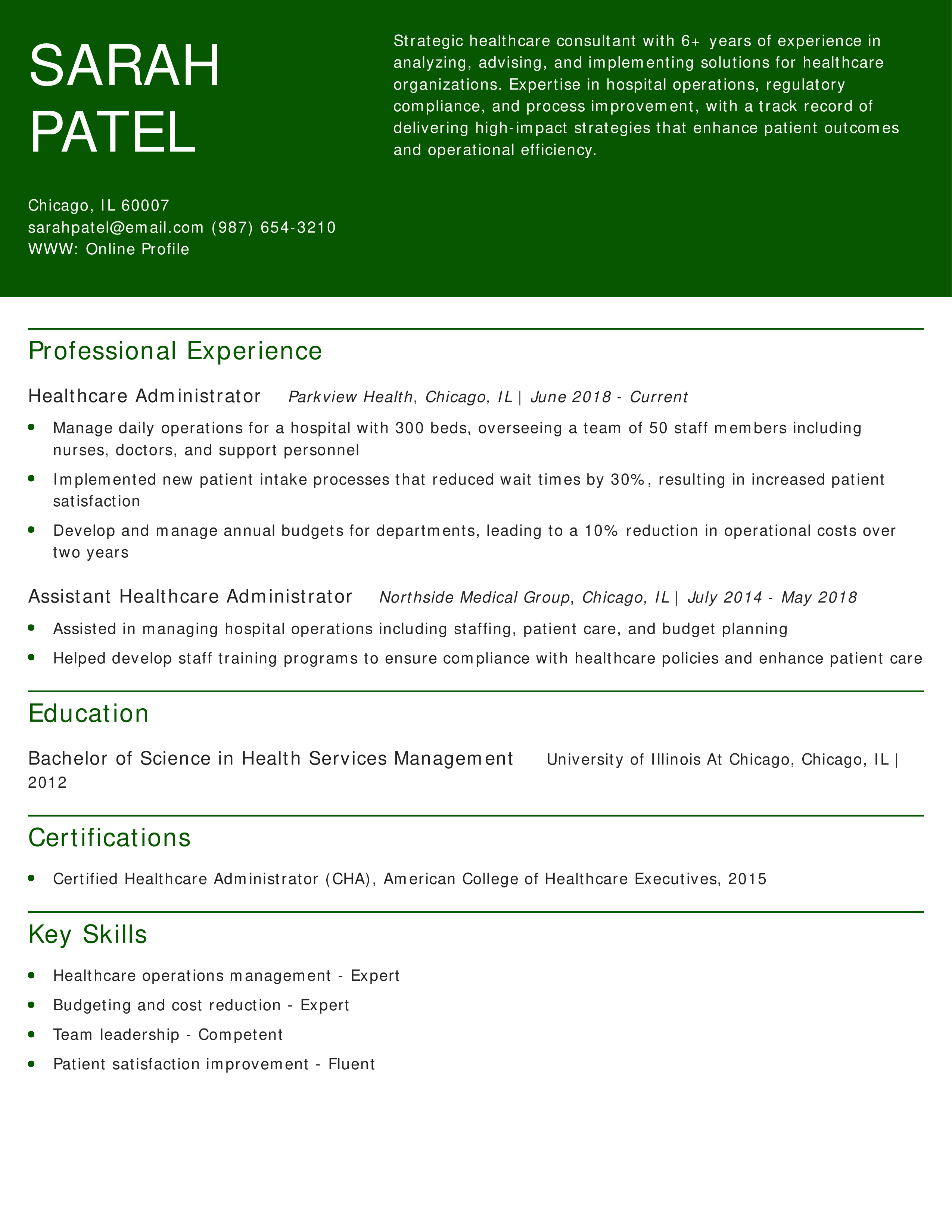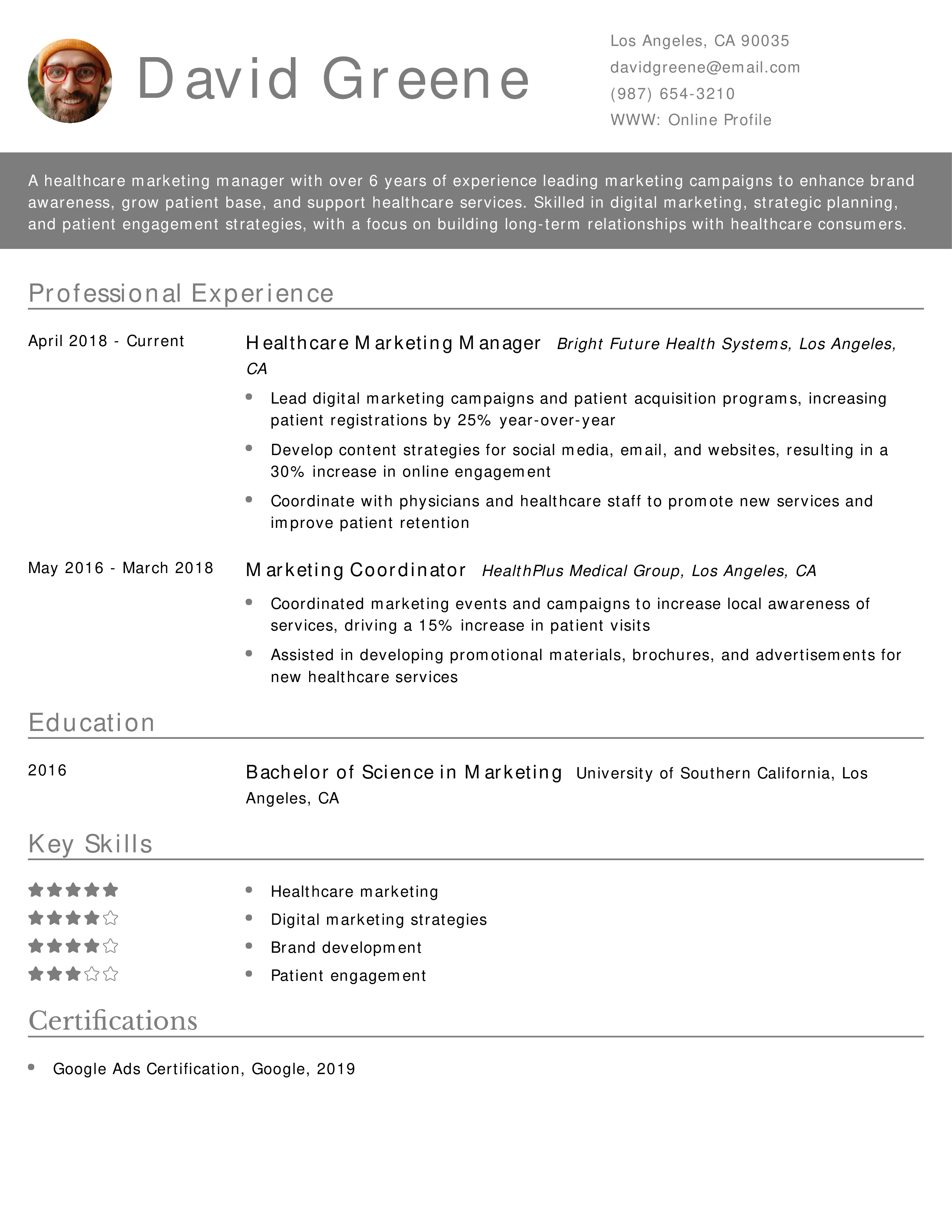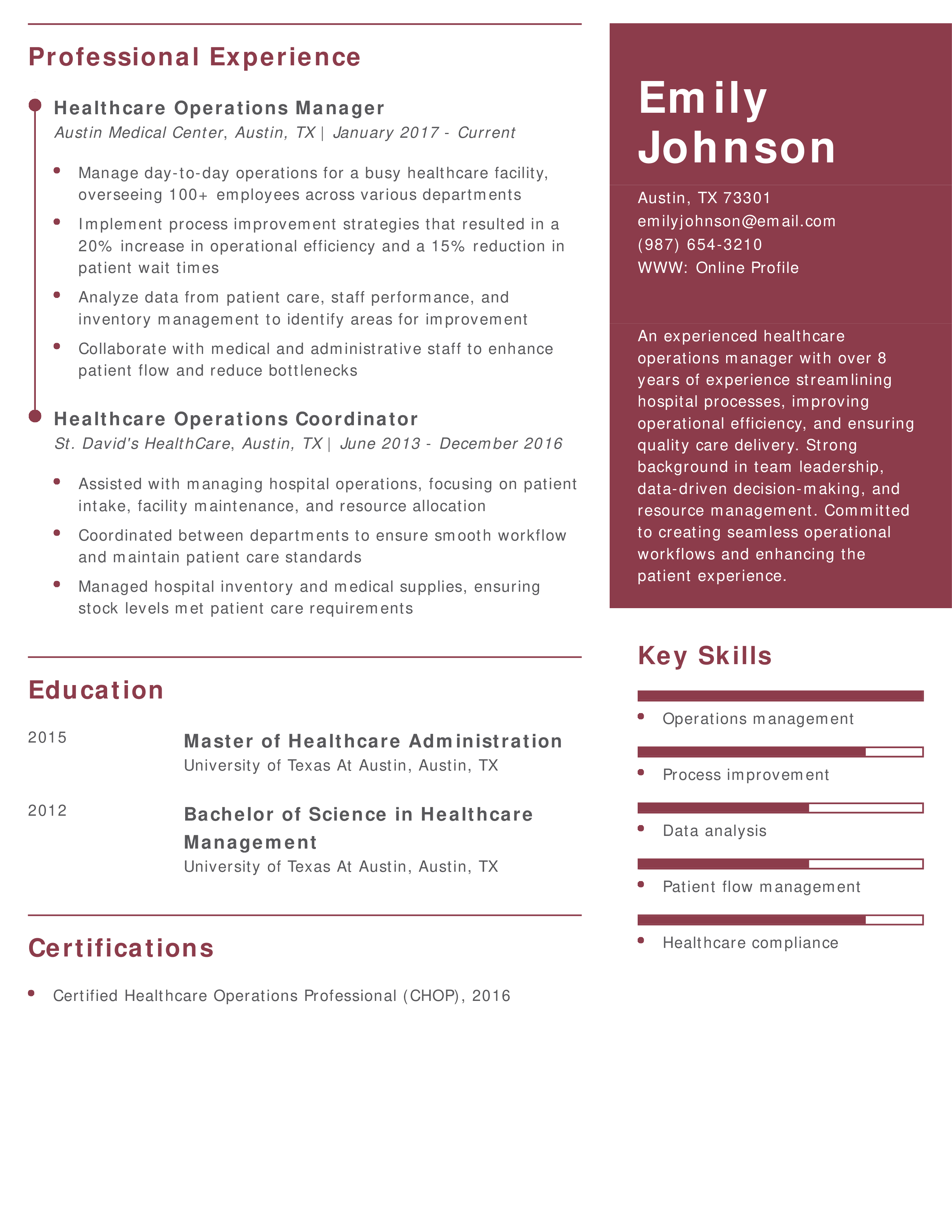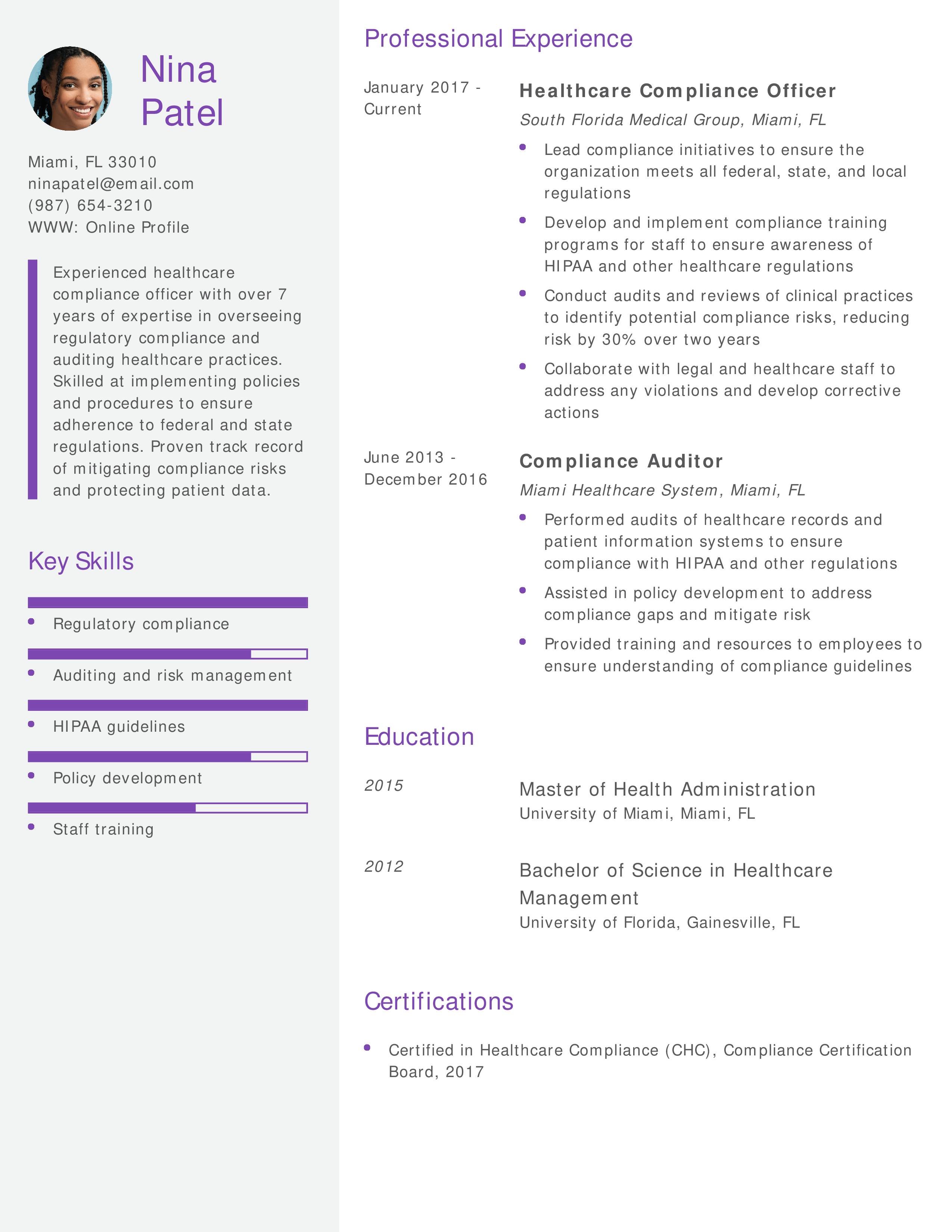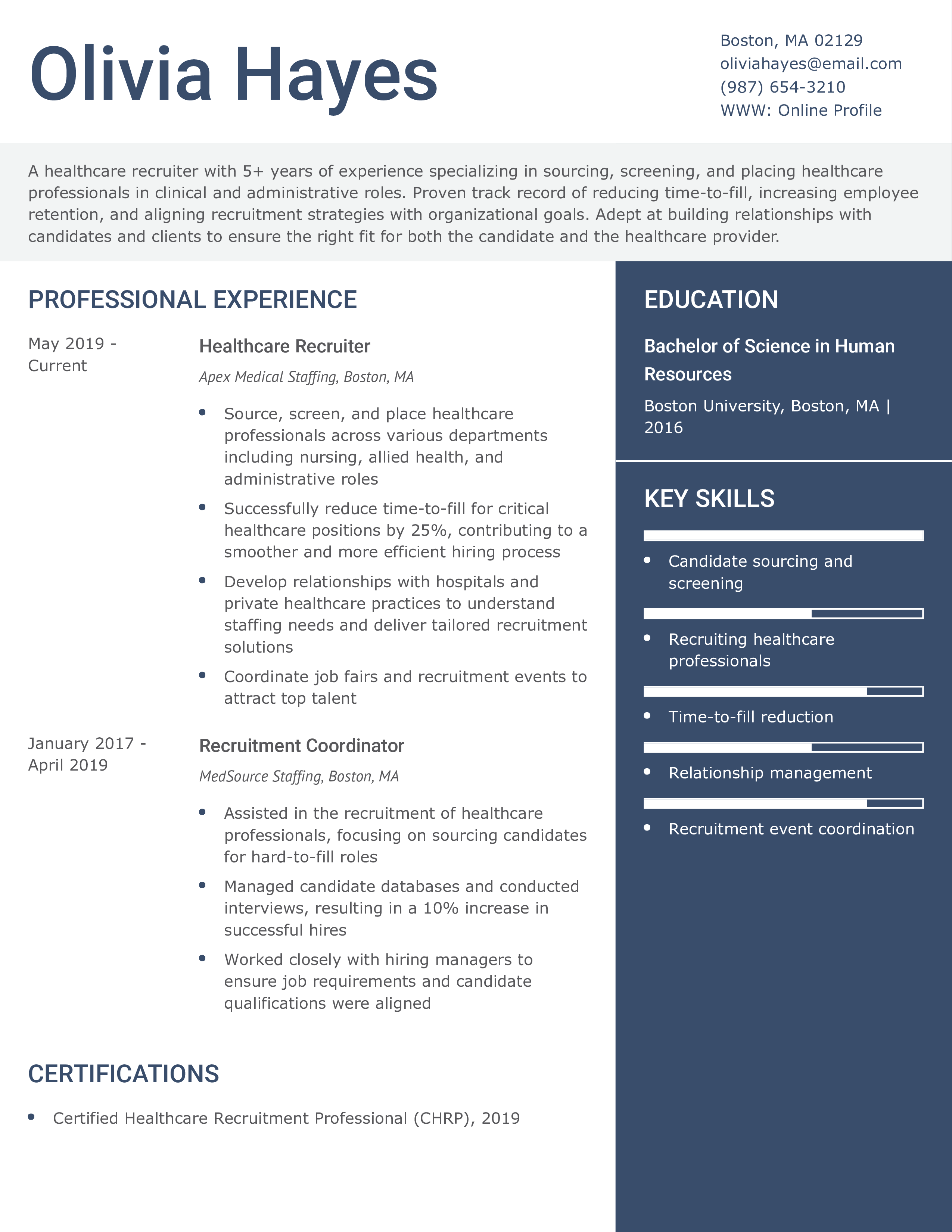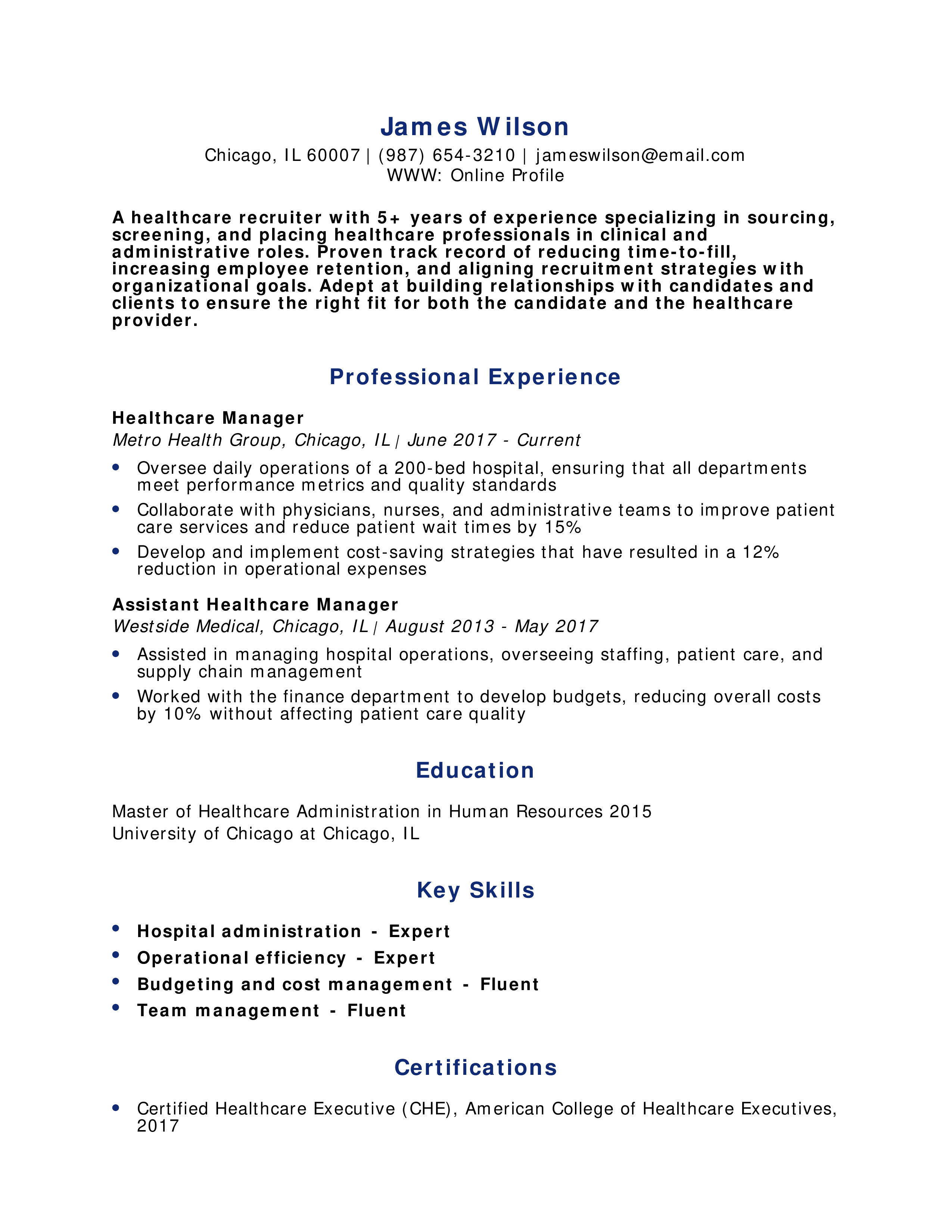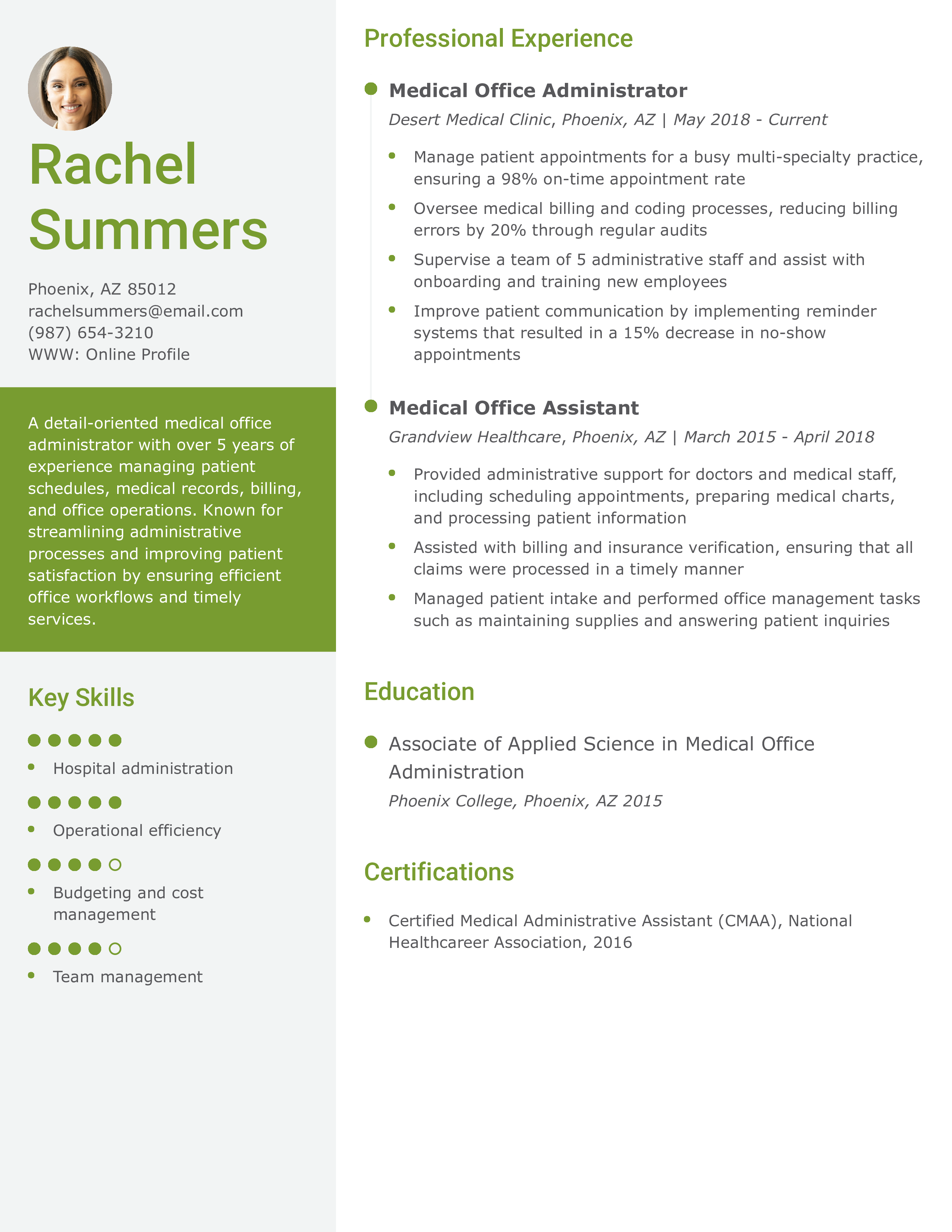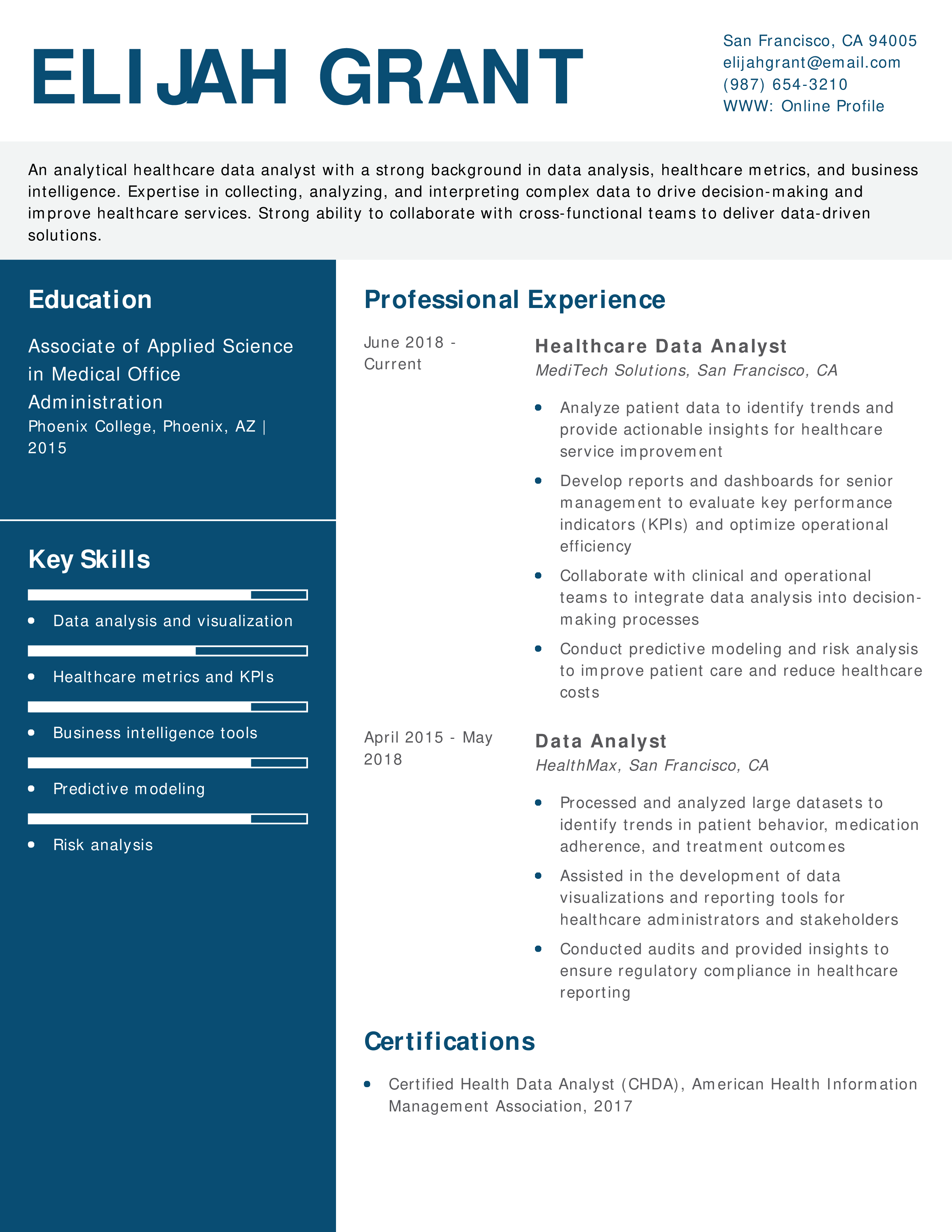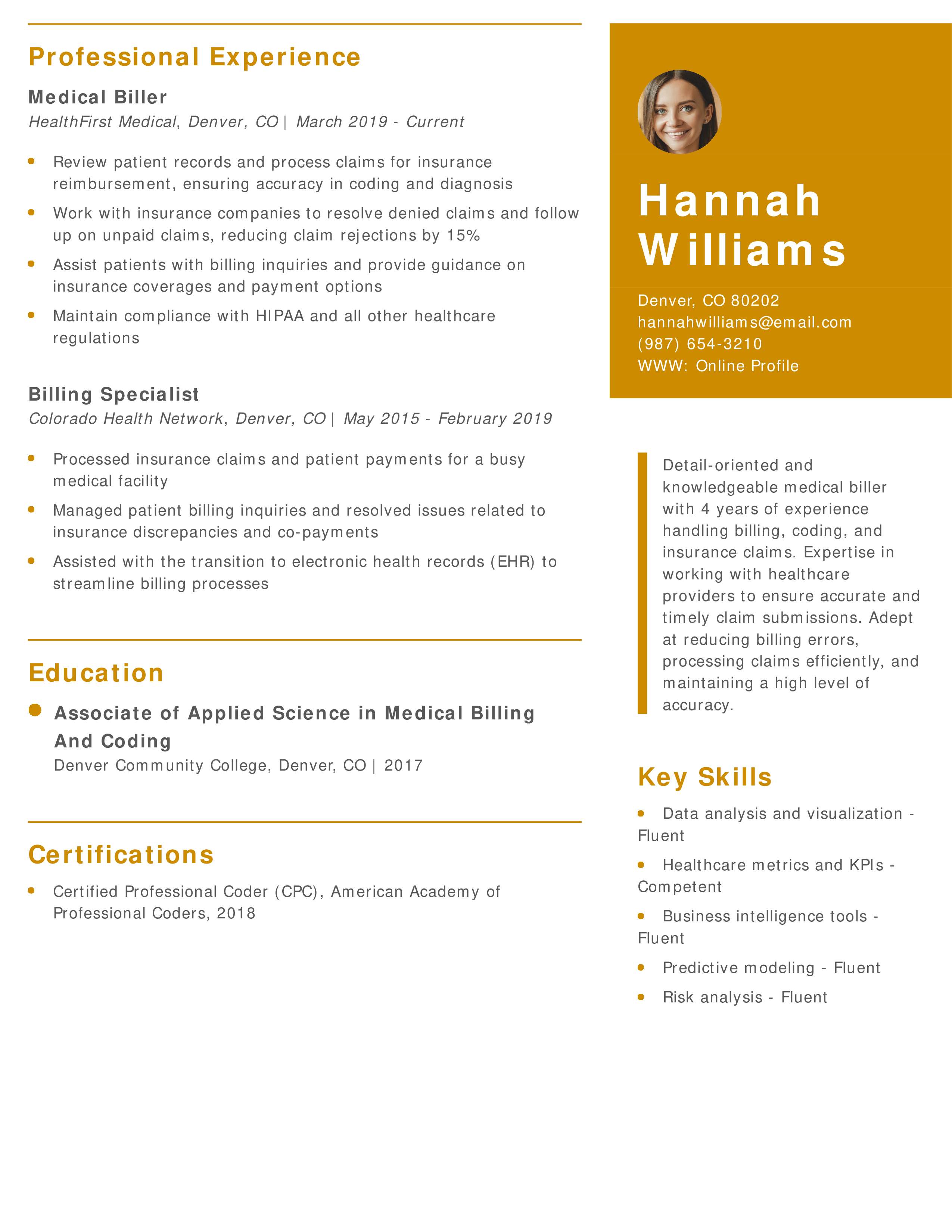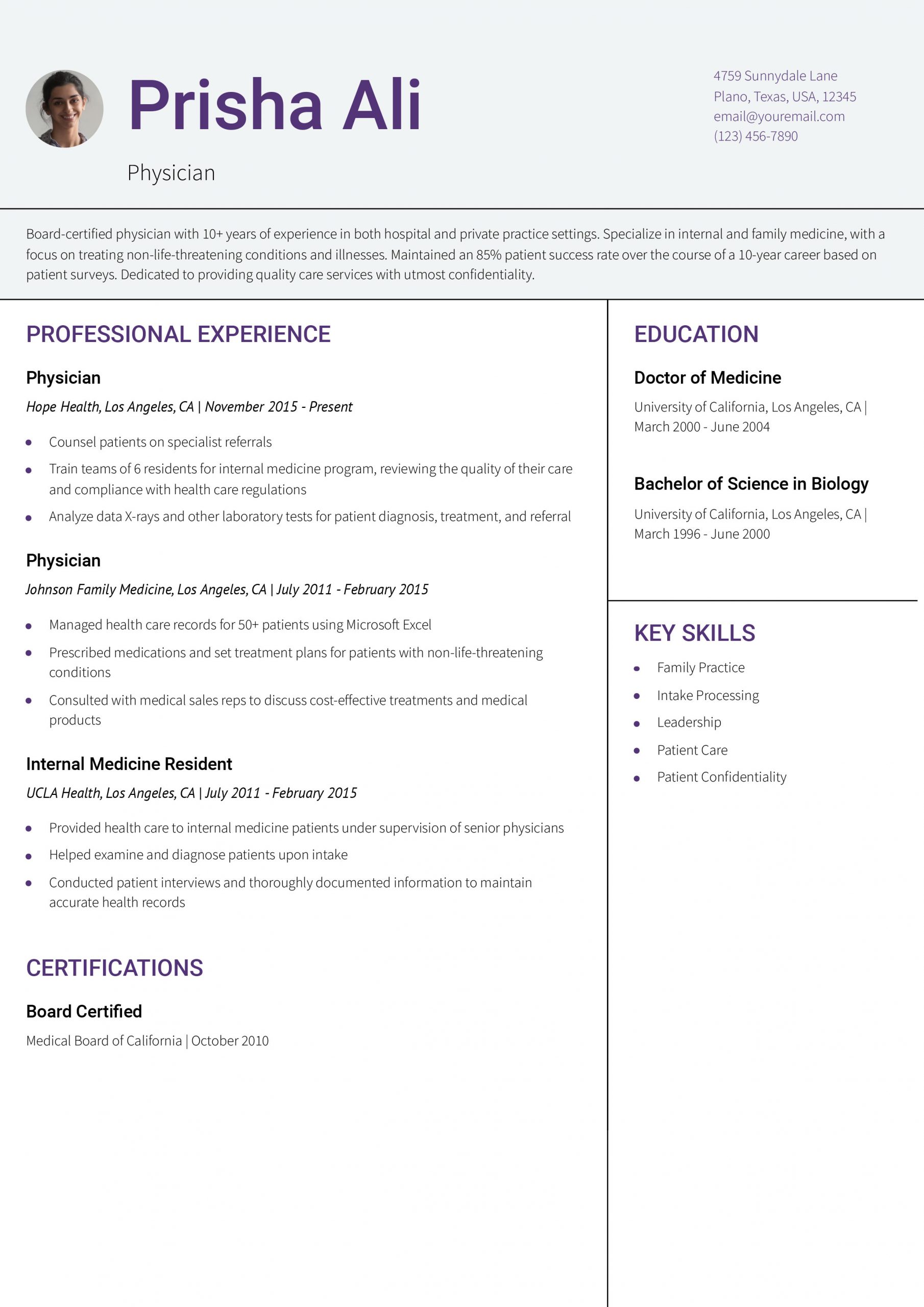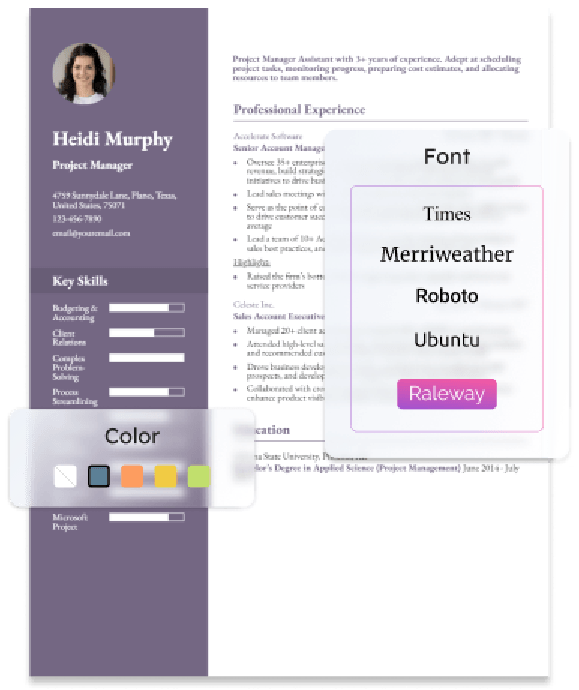Madeline Wentworth
(289) 384-2944
[email protected]
LinkedIn | Portfolio
342 Walnut Street, Bismarck, ND 58503
Profile
Reliable licensed dental hygiene professional with 6+ years of experience in innovative, modern dental practice. Expertise working with diverse populations, including adolescents, medically compromised, and geriatrics. Experience in soft tissue management, whitening procedures, periodontal charting, sonic and ultrasonic instrumentation. Certified in Basic Life Support and Nitrous Oxide Monitoring. Able to work independently and collaboratively with dentist and office staff and provide mentoring and training to new staff members. Competent in dental laboratory skills and familiar with electronic health recording systems.
Professional Experience
Dental Hygienist, Bismarck Dental Services, Bismarck, ND
May 2014 — Present
- Review patients’ health and oral health history prior to dental hygiene procedures
- Manage patient anxiety using pleasant demeanor, education, and empathy
- Examine patients’ teeth, removing plaque and calculus, performing debridement and root planing as needed
- Operate digital X-ray machine to provide intraoral radiographs
- Counsel patients on the importance of proper oral hygiene
- Introduced innovative cleaning approach to reduce patient discomfort and anxiety
Digital Orthodontic Lab Tech, ACME Orthodontics, Lincoln, ND
January 2011 — April 2013
- Prepared digital models for 3D printing
- Scanned existing plaster models into digital files
- Prepared models and aligners for moving teeth
- Cleaned and prepped printed models for appliance fabrication
- Operated lab equipment
- Followed lab operations policies and procedures
Education
Dental Hygiene Program, North Dakota State College of Science, Wahpeton, ND | September 2011 — May 2013
Key Skills
- Provide diagnostic, preventive, therapeutic, and minimally invasive restorative services
- Help patients develop and maintain good oral health
- Educate patients on the relationship between diet and oral health
- Guide patients’ selection of oral care devices
- Document patient care and treatment plans
Certifications
- Basic Life Support
- Nitrous Oxide Monitoring
Prisha Ali
(111) 121-2121
[email protected]
LinkedIn | Portfolio
3031 Brannon Street, Los Angeles, CA 90017
Profile
Board-certified physician with 10+ years of experience in both hospital and private practice settings. Specialize in internal and family medicine, with a focus on treating non-life-threatening conditions and illnesses. Maintained an 85% patient success rate over the course of a 10-year career based on patient surveys. Dedicated to providing quality care services with utmost confidentiality.
Professional Experience
Physician, Hope Health, Los Angeles, CA
November 2015 – Present
- Counsel patients on specialist referrals
- Train teams of 6 residents for internal medicine program, reviewing the quality of their care and compliance with health care regulations
- Analyze data X-rays and other laboratory tests for patient diagnosis, treatment, and referral
Physician, Johnson Family Medicine, Los Angeles, CA
July 2011 – February 2015
- Managed health care records for 50+ patients using Microsoft Excel
- Prescribed medications and set treatment plans for patients with non-life-threatening conditions
- Consulted with medical sales reps to discuss cost-effective treatments and medical products
Internal Medicine Resident, UCLA Health, Los Angeles, CA
July 2011 – February 2015
- Provided health care to internal medicine patients under supervision of senior physicians
- Helped examine and diagnose patients upon intake
- Conducted patient interviews and thoroughly documented information to maintain accurate health records
Education
Doctor of Medicine, University of California, Los Angeles, CA | June 2004
Bachelor of Science in Biology, University of California, Los Angeles, CA | June 2000
Key Skills
- Family Practice
- Intake Processing
- Leadership
- Patient Care
- Patient Confidentiality
Certifications
- Board Certified, Medical Board of California | 2010
James Corbin
(123) 456-7890
[email protected]
LinkedIn | Portfolio
123 Your Street, Nashville, TN 12345
Profile
A certified Emergency Medical Technician (EMT) with entry-level experience, specializing in patient transport, pre-hospital care, communication, and ambulance operation. Adept at coordinating with medical teams to deliver emergency treatment to patients in crisis situations.
Professional Experience
Emergency Medical Technician (EMT), Southwest Medical, Nashville, TN
June 2021 – Present
- Deliver first aid, basic life support, and emergency medical treatment to 50+ patients per week in a wide range of emergency medical situations
- Ensure the safe transport of patients and administer appropriate medical treatment on-scene and in route to hospitals, including CPR and pharmaceutical interventions
- Conduct preventative maintenance on ambulatory vehicles and perform equipment inspections to identify potential defects
- Communicate with patients and families on-site to obtain medical histories and identify appropriate treatments based on symptoms
Volunteer Experience
Volunteer, Southwest Medical, Nashville, TN
June 2020 – June 2021
- Provided patient transport support to a 200-bed hospital as a volunteer, which included transporting patients in wheelchairs to and from appointments within the facility
- Interfaced with a diverse patient population, communicated with empathy and professionalism, and ensured safe transport of patients
Education
Bachelor of Science (B.S.) Emergency Medical Services (EMS), University of Nashville, Nashville, TN | September 2012 – May 2016
Key Skills
- Patient Care
- Vital Sign Monitoring
- Emergency Medical Service (EMS)
- Communication
- Patient Transport
Certifications
- EMT-Basic Certification from the National Registry of Emergency Medical Technicians (Active), June 2021
- Advanced Life Support (ALS), American Heart Association, June 2021
Sarah Johnson
(123) 456-7890
[email protected]
LinkedIn | Portfolio
New York, NY 12345
Profile
Forward-looking nurse manager with over eight years of experience. Offer advanced expertise in patient care, health care administration, and policy development and interpretation. Strong background managing cross-functional teams and guiding delivery of complex patient care services. Adept at building a highly collaborative, accountable work culture. Master of Science in Nursing from Columbia University. Bilingual: fluent in English and Spanish.
Key Skills
- Clinical operations management
- Cost reduction and elimination
- Cross-functional collaboration
- Patient-centered long-term care
- Policy development and enforcement
- Process improvement
- Task prioritization
Professional Experience
Nurse Manager, St. Matthew Nursing Home, New York, NY
June 2014 to present
- Varied management role at this 200-bed nursing home providing long-term care, short-term rehab, and hospice care services
- Oversee and develop a cross-functional team of 30 health care professionals, including dieticians, social services workers, nurses, physical therapists, and medical assistants
- Develop clinical policies, standards, and initiatives to improve patient advocacy and health outcomes
- Educate patients and families on short- and long-term treatment plans, and develop customer service plans based on cultural, emotional, and spiritual needs
Education
Columbia University, New York, NY
- Master of Science (MS) – Nursing
- Bachelor of Science (BS) – Nursing
Certification
- Licensed Nursing Home Administrator, New York State
Language
Lakshmi Bai
(930) 204-2945
[email protected]
LinkedIn | Portfolio
Encino, CA 48992
Profile
A patient-centered Phlebotomist with eight years of clinical experience, specializing in laboratory operations, patient relations, and specimen handling. Adept at performing venipunctures and capillary punctures with a 99% accuracy rate.
Professional Experience
Head Phlebotomist, Cedars Sinai South Plaza Drawing Lab, Los Angeles, CA
April 2015 – Present
- Manage a team of three phlebotomists to draw blood, perform laboratory testing, and ensure safe handling of specimens to prevent contamination
- Provide emotional support to anxious patients to ensure comfort during procedures
- Process more than 65 clients daily, carefully handling and documenting all blood draws
- Ensure compliance with Covid-19 safety and infection prevention protocols
Phlebotomist, UCLA Clinical Laboratory Services, Encino, CA
August 2013 – April 2015
- Perform over 25+ blood draws per day for a walk-in clinic, obtain medical history from patients, and prepare specimens for transfer to lab sites for analysis
- Conducted inspections on testing equipment, performed maintenance, and ensured compliance with laboratory safety protocols
- Managed electronic health records (EHR) and data collection for patient history
Education
- Phlebotomy Training and Certification Program, June 2013
- Phlebotomy Training Specialists, Culver City, CA
Skills
- Blood Collection
- Electronic Health Records (EHR)
- Venipuncture Procedures
- Capillary Puncture Procedures
- Specimen Handling
Certifications
- CPT II certification, August 2013
- Advanced phlebotomy CE certificate, National Healthcareer Association
Stephen Ramirez
(333) 000-1234
[email protected]
LinkedIn | Portfolio
4616 Rogers Street, Cincinnati, OH 45202
Profile
A Board Certified Physician with seven years of professional experience, specializing in internal medicine, patient advocacy, leadership, and cardiovascular conditions. A strong history of providing mentorship to internal residents and medical students to improve care delivery.
Professional Experience
Physician, Internal Medicine, Purple Heart Hospital, Cincinnati, OH
September 2015 – Present
- Coordinate with the Director of the Internal Medicine Residency program to manage, train, and develop 30+ residents and medical students
- Develop ideal treatment plans to address non-threatening conditions, such as common colds, cases of flu, ear infections, and allergies
- Diagnose and treat patients with acute illness, such as bacterial and viral infections, and chronic diseases and conditions, like hypertension, heart disease, and diabetes
Internal Medicine Resident, The Ohio State University Department of Internal Medicine, Cleveland, OH
August 2012 – September 2015
- Coordinated with faculty physicians and other residents to provide care to patients with chronic conditions and acute illnesses
- Provided specialized care to patients in the sub-specialty ward, developed treatment plans, and educated patients on diagnosis and long-term health risks
- Participated in a month-long IM-PECS rotation
Education
- Doctor of Medicine, Baylor College Of Medicine, Houston, TX | September 2008 – June 2012
- Bachelor of Science in Biology, The University Of Houston, Houston, TX | September 2004 – June 2008
Key Skills
- Internal Medicine
- Family Medicine
- Mentorship
- Communication
- Bilingual
Certifications
- Board Certified, State Medical Board of Ohio, 2018
Emily Carter
(123) 456-7890
[email protected]
LinkedIn | Portfolio
New York, NY 12345
Profile
Experienced Director of Nursing with 10+ years of leadership in hospital and long-term care settings. Proven expertise in clinical operations, staff development, and regulatory compliance. Adept at enhancing patient care strategies, reducing hospital-acquired infections, and improving workflow efficiency. Skilled at leading large nursing teams while fostering a culture of accountability and excellence.
Professional Experience
Director of Nursing, New York General Hospital, New York, NY
July 2015 – Present
- Lead a team of 50+ RNs and LPNs across multiple departments, improving patient care efficiency
- Spearheaded a new patient assessment protocol, reducing readmission rates by 18%
- Implemented staff development programs, resulting in a 20% increase in nurse retention
- Collaborate with hospital leadership to optimize workflow and improve compliance with state health regulations
Nurse Supervisor, Broadway Long-Term Care Facility, New York, NY
May 2012 – July 2015
- Managed day-to-day nursing operations for a 250-bed facility
- Developed and enforced infection control measures, decreasing cases by 25%
- Led interdisciplinary meetings to improve patient outcomes and care plans
Certifications
- Certified Nurse Executive (CNE), 2016
- Advanced Cardiac Life Support (ACLS), 2015
Education
Master of Science (M.S.) in Nursing Leadership, Columbia University, New York, NY | 2012
Elena Martinez
(925) 304-1123
[email protected]
LinkedIn | Portfolio
San Diego, CA 92110
Profile
Detail-oriented Certified Phlebotomy Technician (CPT) with seven years of experience in specimen collection, patient care, and laboratory processing. Expertise in venipuncture, capillary punctures, and blood specimen handling, with a track record of maintaining a 98% first-attempt success rate. Dedicated to providing a compassionate, patient-focused experience while ensuring compliance with safety and infection control protocols.
Professional Experience
Lead Phlebotomy Technician, Scripps Memorial Hospital, San Diego, CA
June 2016 – Present
- Supervise and train a team of four phlebotomists, ensuring adherence to safety and laboratory protocols
- Perform over 70 blood draws daily, including routine, STAT, and pediatric collections
- Implemented a barcode scanning system, reducing specimen labeling errors by 30%
- Assist physicians and nursing staff in emergency procedures requiring rapid specimen collection
- Educate patients on blood collection procedures to alleviate anxiety and improve patient cooperation
Phlebotomist, Sharp Healthcare Outpatient Lab, San Diego, CA
May 2014 – June 2016
- Conducted an average of 40 blood draws per shift, including venipuncture and capillary punctures
- Maintained sterile technique and strict adherence to OSHA and CLIA guidelines
- Processed and labeled specimens for hematology, chemistry, and microbiology testing
- Updated Electronic Health Records (EHR), ensuring accurate documentation and test tracking
Education
Phlebotomy Training Program, California Institute of Medical Science, San Diego, CA | 2014
Certifications
- Certified Phlebotomy Technician (CPT-I), California Department of Public Health, 2014
- Basic Life Support (BLS) Certification, American Heart Association, 2015
Key Skills
- Blood Collection & Venipuncture
- Patient Communication & Comfort
- Specimen Labeling & Processing
- Electronic Health Records (EHR)
- Infection Control & Safety Compliance
- Team Leadership & Training
Dr. Nathaniel Carter
(444) 555-6789
[email protected]
LinkedIn | Portfolio
1207 Elm Street, Columbus, OH 43215
Profile
Dedicated Primary Care Physician with eight years of experience providing comprehensive patient care, chronic disease management, and preventative medicine. Specializes in holistic patient assessments, internal medicine, and health education. Committed to delivering patient-centered care and mentoring medical residents in clinical best practices.
Professional Experience
Primary Care Physician, Ohio Wellness Medical Group, Columbus, OH
October 2016 – Present
- Provide preventative, diagnostic, and treatment services for a diverse patient population, managing acute and chronic conditions such as hypertension, diabetes, and cardiovascular disease
- Lead a team of nurse practitioners and physician assistants, ensuring consistent, high-quality patient care
- Develop personalized treatment plans, integrating lifestyle counseling and medication management to improve patient outcomes
- Spearheaded a telemedicine initiative, increasing patient accessibility and reducing appointment wait times by 30%
- Mentor medical interns and residents, enhancing their clinical skills in diagnostics and patient interaction
Internal Medicine Resident, Mount Carmel Health System, Columbus, OH
July 2013 – October 2016
- Managed a broad range of complex medical cases, collaborating with specialists to provide multidisciplinary care
- Performed comprehensive medical assessments, including laboratory analysis, imaging interpretation, and differential diagnosis
- Implemented patient education programs, improving medication adherence rates by 20%
Education
- Doctor of Medicine (M.D.), University of Cincinnati College of Medicine, Cincinnati, OH | 2013
- Bachelor of Science (B.S.) in Biomedical Sciences, The Ohio State University, Columbus, OH | 2009
Certifications
- Board Certified in Internal Medicine, American Board of Internal Medicine, 2017
- Basic Life Support (BLS) Certification, American Heart Association, 2013
Key Skills
- Primary & Preventative Care
- Chronic Disease Management
- Telemedicine & Digital Health
- Patient Education & Advocacy
- Multidisciplinary Team Leadership
- Internal Medicine Diagnostics
Amanda Reynolds
(123) 456-7890
[email protected]
LinkedIn | Portfolio
Boston, MA 02118
Profile
Strategic Clinical Nursing Director with 10+ years of leadership experience in hospital administration, patient safety, and nursing team development. Skilled at enhancing patient care quality, implementing evidence-based nursing practices, and leading multidisciplinary teams. Adept at policy development, compliance oversight, and fostering a collaborative health care environment.
Professional Experience
Clinical Nursing Director, Massachusetts General Hospital, Boston, MA
August 2015 – Present
- Oversee daily operations for a 250-bed acute care unit, ensuring compliance with state and federal health care regulations
- Lead a team of 40+ RNs, LPNs, and support staff, implementing professional development programs to enhance skills and retention
- Developed patient safety protocols, reducing medication errors by 22%
- Collaborate with hospital administration to optimize workflow efficiency, improving patient discharge rates by 15%
Nurse Supervisor, Boston Medical Center, Boston, MA
June 2012 – August 2015
- Managed a high-acuity unit, overseeing nursing schedules, patient flow, and staff evaluations
- Assisted in the development of hospital-wide infection control protocols, reducing hospital-acquired infections (HAIs) by 18%
- Coordinated with interdisciplinary teams to enhance patient experience and satisfaction
Education
- Master of Science (M.S.) in Nursing Leadership, Boston University, Boston, MA | 2012
- Bachelor of Science (B.S.) in Nursing, University of Massachusetts, Amherst, MA | 2010
Certifications
- Certified Nurse Executive (CNE), 2015
- Advanced Cardiac Life Support (ACLS), 2013
Michael Roberts
(123) 456-7890
[email protected]
LinkedIn | Portfolio
123 Elm Street, San Francisco, CA 94102
Profile
Experienced healthcare manager with over eight years of experience in managing hospital operations, improving patient outcomes, and reducing costs. Adept at developing efficient systems for operational performance, leading cross-functional teams, and implementing healthcare policies to comply with legal standards.
Professional Experience
Healthcare Manager, Golden Gate Health, San Francisco, CA
August 2017 – Present
- Oversee daily operations of a 100-bed hospital, managing a team of 25 staff members
- Implement patient care improvement programs that resulted in a 20% increase in patient satisfaction ratings
- Develop and maintain budgets, ensuring efficient resource allocation that cut operational costs by 15%
- Coordinate with physicians, nurses, and administrators to ensure high-quality care and compliance with healthcare regulations
Operations Coordinator, Pacific Care Hospital, San Francisco, CA
June 2014 – August 2017
- Assisted in managing hospital operations, including patient scheduling, staff assignments, and facility maintenance
- Managed patient records and ensured compliance with HIPAA regulations
- Developed and managed weekly reports on hospital performance and productivity
Education
- Master of Science (MS) in Healthcare Management, University of California, Berkeley, CA | 2014
- Bachelor of Science (BS) in Healthcare Administration, University of California, Los Angeles, CA | 2012
Key Skills
- Healthcare operations management
- Budget development
- Patient care improvement
- Cross-functional team leadership
- Compliance and regulations
Certifications
Certified Healthcare Manager (CHM), American College of Healthcare Executives (ACHE), 2016
Jessica Lee
(555) 123-4567
[email protected]
LinkedIn | Portfolio
Chicago, IL 60601
Profile
Dynamic healthcare recruiter with five years of experience specializing in talent acquisition for healthcare organizations. Skilled at identifying qualified candidates, coordinating interviews, and improving recruiting strategies. Expertise in sourcing candidates for diverse healthcare roles, including nursing, administration, and medical support staff.
Professional Experience
Healthcare Recruiter, Mercy Health System, Chicago, IL
April 2019 – Present
- Recruit and hire qualified candidates for a variety of healthcare positions, including nursing, physicians, and administrative staff
- Streamlined the hiring process, reducing the time-to-hire by 25%
- Work closely with hiring managers to assess candidate suitability, ensuring a perfect match for hospital and clinic teams
- Manage job postings and develop recruitment materials to attract top-tier talent
Recruitment Coordinator, Chicago Medical Group, Chicago, IL
June 2016 – April 2019
- Coordinated candidate interviews, background checks, and reference verification
- Assisted in onboarding new healthcare employees, ensuring they received proper training and compliance with organizational policies
- Managed recruitment databases and kept track of hiring metrics
Education
Bachelor of Science (B.S.) in Human Resources Management, DePaul University, Chicago, IL | 2016
Key Skills
- Talent acquisition
- Healthcare recruiting
- Interviewing
- Candidate assessment
- Hiring metrics
Certifications
Certified Healthcare Recruiter (CHR), National Association of Healthcare Recruitment (NAHCR), 2018
Tina Davis
(444) 555-6789
[email protected]
LinkedIn | Portfolio
Miami, FL 33101
Profile
Highly skilled healthcare administrator with a decade of experience managing both small and large healthcare facilities. Adept at improving organizational efficiency, managing staff, and ensuring compliance with healthcare laws and regulations. Focused on enhancing patient care while managing costs and optimizing workflows.
Professional Experience
Healthcare Administrator, St. Luke’s Medical Center, Miami, FL
July 2015 – Present
- Oversee all aspects of medical facility operations, ensuring compliance with all healthcare laws and regulations
- Manage a team of 50+ staff, including medical, administrative, and support personnel
- Develop and implement operational strategies that reduce costs by 18% while maintaining high standards of patient care
- Enhance patient experience through staff training programs focused on customer service and medical safety
Assistant Healthcare Administrator, Miami General Hospital, Miami, FL
May 2010 – June 2015
- Assisted with the daily operations of a 500-bed hospital, managing budgets, patient intake, and healthcare operations
- Developed and maintained staff schedules to ensure smooth operational flow
- Monitored hospital compliance with state and federal health regulations
Education
- Master of Healthcare Administration, University of Miami, Miami, FL | 2010
- Bachelor of Science (B.S.) in Health Services Administration, University of Florida, Gainesville, FL | 2007
Key Skills
- Healthcare facility management
- Budget management
- Compliance and regulations
- Staff development
- Operational strategy
Certifications
Certified Healthcare Executive (CHE), American College of Healthcare Executives (ACHE), 2015
Marcus Lee
(321) 555-4321
[email protected]
LinkedIn | Portfolio
Houston, TX 77001
Profile
Results-driven healthcare sales representative with 5+ years of experience selling medical devices and pharmaceutical products to hospitals, clinics, and healthcare professionals. Proven track record of exceeding sales targets, building strong customer relationships, and providing high-level product education to healthcare providers.
Professional Experience
Healthcare Sales Representative, MedTech Solutions, Houston, TX
April 2019 – Present
- Drive sales of medical devices and products, achieving 120% of annual sales target
- Cultivate and maintain strong relationships with key decision-makers at hospitals and healthcare clinics
- Conduct product demonstrations and provide educational sessions for healthcare providers on the latest medical devices and pharmaceuticals
- Collaborate with the marketing team to develop promotional materials and sales campaigns
Sales Associate, Biomed Industries, Houston, TX
June 2016 – April 2019
- Sold medical equipment to healthcare institutions, focusing on building long-term relationships with key hospital clients
- Managed sales territory, achieving 110% of sales quotas consistently
- Conducted product training sessions for medical staff, improving customer knowledge and satisfaction
Education
Bachelor of Science (B.S.) in Biology, University of Houston, Houston, TX | 2016
Key Skills
- Medical device sales
- Customer relationship management
- Product demonstrations
- Sales strategy
- Negotiation
Certifications
Certified Medical Sales Representative (CMSR), Medical Sales College, 2017
Lauren Wright
(212) 333-4444
[email protected]
LinkedIn | Portfolio
New York, NY 10001
Profile
Strategic healthcare consultant with 6+ years of experience in analyzing, advising, and implementing solutions for healthcare organizations. Expertise in hospital operations, regulatory compliance, and process improvement, with a track record of delivering high-impact strategies that enhance patient outcomes and operational efficiency.
Professional Experience
Healthcare Consultant, Innovative Health Solutions, New York, NY
January 2018 – Present
- Provide advisory services to healthcare organizations on operational efficiency, compliance, and patient care improvement
- Develop and implement strategies to streamline patient intake processes, reducing wait times by 15%
- Analyze data to identify gaps in performance and recommend system changes, resulting in a 20% increase in productivity
- Conduct workshops and training for staff to ensure implementation of best practices
Healthcare Operations Analyst, MedConsulting Group, New York, NY
March 2015 – December 2017
- Analyzed operational data to identify opportunities for cost reduction and process improvement
- Assisted in the development of new patient care models, improving patient satisfaction scores by 18%
- Collaborated with medical staff to develop streamlined workflows for healthcare delivery
Education
- Master of Healthcare Administration, Columbia University, New York, NY | 2015
- Bachelor of Science (B.S.) in Health Services Management, University of Pennsylvania, Philadelphia, PA | 2012
Key Skills
- Healthcare operations
- Regulatory compliance
- Strategic planning
- Process improvement
- Staff training
Certifications
Certified Healthcare Consultant (CHC), National Society of Healthcare Consultants, 2017
Sarah Patel
(123) 555-7890
[email protected]
LinkedIn | Portfolio
3001 Elm Street, Chicago, IL 60604
Profile
A healthcare administrator with over 7 years of experience in managing operations and improving healthcare delivery within both clinical and hospital settings. Expertise in resource management, team leadership, and patient care. A strong track record of improving efficiency and cutting costs while maintaining patient satisfaction and compliance with healthcare regulations.
Professional Experience
Healthcare Administrator, Parkview Health, Chicago, IL
June 2018 – Present
- Manage daily operations for a hospital with 300 beds, overseeing a team of 50 staff members including nurses, doctors, and support personnel
- Implemented new patient intake processes that reduced wait times by 30%, resulting in increased patient satisfaction
- Develop and manage annual budgets for departments, leading to a 10% reduction in operational costs over two years
- Ensure compliance with federal and state healthcare regulations, conducting regular audits and inspections
Assistant Healthcare Administrator, Northside Medical Group, Chicago, IL
July 2014 – May 2018
- Assisted in managing hospital operations including staffing, patient care, and budget planning
- Helped develop staff training programs to ensure compliance with healthcare policies and enhance patient care
- Coordinated between departments to ensure efficient workflow and optimal patient care
Education
- Master of Healthcare Administration, University of Illinois, Chicago, IL | 2014
- Bachelor of Science in Health Services Management, University of Illinois, Chicago, IL | 2012
Key Skills
- Healthcare operations management
- Budgeting and cost reduction
- Team leadership
- Patient satisfaction improvement
- Regulatory compliance
Certifications
Certified Healthcare Administrator (CHA), American College of Healthcare Executives, 2015
David Greene
(333) 444-5555
[email protected]
LinkedIn | Portfolio
4550 Maple Ave, Los Angeles, CA 90001
Profile
A healthcare marketing manager with over 6 years of experience leading marketing campaigns to enhance brand awareness, grow patient base, and support healthcare services. Skilled in digital marketing, strategic planning, and patient engagement strategies, with a focus on building long-term relationships with healthcare consumers.
Professional Experience
Healthcare Marketing Manager, Bright Future Health Systems, Los Angeles, CA
April 2018 – Present
- Lead digital marketing campaigns and patient acquisition programs, increasing patient registrations by 25% year-over-year
- Develop content strategies for social media, email, and websites, resulting in a 30% increase in online engagement
- Coordinate with physicians and healthcare staff to promote new services and improve patient retention
- Conduct market research and analyze patient feedback to create targeted marketing strategies
Marketing Coordinator, HealthPlus Medical Group, Los Angeles, CA
May 2016 – March 2018
- Coordinated marketing events and campaigns to increase local awareness of services, driving a 15% increase in patient visits
- Assisted in developing promotional materials, brochures, and advertisements for new healthcare services
- Managed social media channels and produced engaging content to enhance brand presence
Education
Bachelor of Science (B.S.) in Marketing, University of Southern California, Los Angeles, CA | 2016
Key Skills
- Healthcare marketing
- Digital marketing strategies
- Brand development
- Patient engagement
- Content creation
Certifications
Google Ads Certification, Google, 2019
Emily Johnson
(567) 888-9999
[email protected]
LinkedIn | Portfolio
667 Park Ave, Austin, TX 73301
Profile
An experienced healthcare operations manager with over 8 years of experience streamlining hospital processes, improving operational efficiency, and ensuring quality care delivery. Strong background in team leadership, data-driven decision-making, and resource management. Committed to creating seamless operational workflows and enhancing the patient experience.
Professional Experience
Healthcare Operations Manager, Austin Medical Center, Austin, TX
January 2017 – Present
- Manage day-to-day operations for a busy healthcare facility, overseeing 100+ employees across various departments
- Implement process improvement strategies that resulted in a 20% increase in operational efficiency and a 15% reduction in patient wait times
- Analyze data from patient care, staff performance, and inventory management to identify areas for improvement
- Collaborate with medical and administrative staff to enhance patient flow and reduce bottlenecks
Healthcare Operations Coordinator, St. David’s HealthCare, Austin, TX
June 2013 – December 2016
- Assisted with managing hospital operations, focusing on patient intake, facility maintenance, and resource allocation
- Coordinated between departments to ensure smooth workflow and maintain patient care standards
- Managed hospital inventory and medical supplies, ensuring stock levels met patient care requirements
Education
- Master of Healthcare Administration, University of Texas, Austin, TX | 2015
- Bachelor of Science in Healthcare Management, University of Texas, Austin, TX | 2012
Key Skills
- Operations management
- Process improvement
- Data analysis
- Patient flow management
- Healthcare compliance
Certifications
Certified Healthcare Operations Professional (CHOP), 2016
Jason Turner
(111) 222-3333
[email protected]
LinkedIn | Portfolio
123 River Street, Chicago, IL 60606
Profile
Detail-oriented healthcare financial analyst with a strong background in budgeting, forecasting, and financial reporting for healthcare organizations. Expertise in managing financial data, developing cost-saving initiatives, and ensuring compliance with healthcare regulations. Proven success in improving financial performance in healthcare settings.
Professional Experience
Healthcare Financial Analyst, Chicago Health System, Chicago, IL
January 2018 – Present
- Analyze financial data to support decision-making, prepare detailed reports for senior management, and ensure cost-effective care
- Develop budgets for healthcare services, achieving a 10% reduction in operational costs through efficient resource allocation
- Work with department heads to evaluate expenses and ensure financial goals are met
- Monitor revenue cycles and assist in pricing strategies to enhance profitability
Financial Analyst, St. Joseph’s Healthcare, Chicago, IL
June 2014 – December 2017
- Assisted in the preparation of monthly, quarterly, and annual financial reports
- Evaluated financial data to assist with strategic planning and forecasting
- Worked closely with the accounts receivable and billing departments to resolve financial discrepancies
Education
Bachelor of Science (B.S.) in Finance, University of Chicago, Chicago, IL | 2014
Key Skills
- Budgeting and forecasting
- Financial reporting
- Cost analysis
- Revenue cycle management
- Healthcare regulations
Certifications
Certified Healthcare Financial Professional (CHFP), Healthcare Financial Management Association, 2016
Nina Patel
(444) 555-6666
[email protected]
LinkedIn | Portfolio
1224 Beach Road, Miami, FL 33101
Profile
Experienced healthcare compliance officer with over 7 years of expertise in overseeing regulatory compliance and auditing healthcare practices. Skilled at implementing policies and procedures to ensure adherence to federal and state regulations. Proven track record of mitigating compliance risks and protecting patient data.
Professional Experience
Healthcare Compliance Officer, South Florida Medical Group, Miami, FL
January 2017 – Present
- Lead compliance initiatives to ensure the organization meets all federal, state, and local regulations
- Develop and implement compliance training programs for staff to ensure awareness of HIPAA and other healthcare regulations
- Conduct audits and reviews of clinical practices to identify potential compliance risks, reducing risk by 30% over two years
- Collaborate with legal and healthcare staff to address any violations and develop corrective actions
Compliance Auditor, Miami Healthcare System, Miami, FL
June 2013 – December 2016
- Performed audits of healthcare records and patient information systems to ensure compliance with HIPAA and other regulations
- Assisted in policy development to address compliance gaps and mitigate risk
- Provided training and resources to employees to ensure understanding of compliance guidelines
Education
- Master of Health Administration, University of Miami, Miami, FL | 2015
- Bachelor of Science in Healthcare Management, University of Florida, Gainesville, FL | 2012
Key Skills
- Regulatory compliance
- Auditing and risk management
- HIPAA guidelines
- Policy development
- Staff training
Certifications
Certified in Healthcare Compliance (CHC), Compliance Certification Board, 2017
Olivia Hayes
(555) 123-4567
[email protected]
LinkedIn | Portfolio
1224 Oak Street, Boston, MA 02134
Profile
A healthcare recruiter with 5+ years of experience specializing in sourcing, screening, and placing healthcare professionals in clinical and administrative roles. Proven track record of reducing time-to-fill, increasing employee retention, and aligning recruitment strategies with organizational goals. Adept at building relationships with candidates and clients to ensure the right fit for both the candidate and the healthcare provider.
Professional Experience
Healthcare Recruiter, Apex Medical Staffing, Boston, MA
May 2019 – Present
- Source, screen, and place healthcare professionals across various departments including nursing, allied health, and administrative roles
- Successfully reduce time-to-fill for critical healthcare positions by 25%, contributing to a smoother and more efficient hiring process
- Develop relationships with hospitals and private healthcare practices to understand staffing needs and deliver tailored recruitment solutions
- Coordinate job fairs and recruitment events to attract top talent
Recruitment Coordinator, MedSource Staffing, Boston, MA
January 2017 – April 2019
- Assisted in the recruitment of healthcare professionals, focusing on sourcing candidates for hard-to-fill roles
- Managed candidate databases and conducted interviews, resulting in a 10% increase in successful hires
- Worked closely with hiring managers to ensure job requirements and candidate qualifications were aligned
Education
Bachelor of Science (B.S.) in Human Resources, Boston University, Boston, MA | 2016
Key Skills
- Candidate sourcing and screening
- Recruiting healthcare professionals
- Time-to-fill reduction
- Relationship management
- Recruitment event coordination
Certifications
Certified Healthcare Recruitment Professional (CHRP), 2019
James Wilson
(555) 987-6543
[email protected]
LinkedIn | Portfolio
4550 Birch Street, Chicago, IL 60605
Profile
An experienced healthcare manager with over 8 years of expertise in hospital administration, patient care management, and compliance with healthcare regulations. Proven ability to improve operational efficiency, reduce costs, and enhance patient care quality through effective team management and strategic planning.
Professional Experience
Healthcare Manager, Metro Health Group, Chicago, IL
June 2017 – Present
- Oversee daily operations of a 200-bed hospital, ensuring that all departments meet performance metrics and quality standards
- Collaborate with physicians, nurses, and administrative teams to improve patient care services and reduce patient wait times by 15%
- Develop and implement cost-saving strategies that have resulted in a 12% reduction in operational expenses
- Conduct regular audits to ensure compliance with healthcare regulations, including HIPAA and OSHA
Assistant Healthcare Manager, Westside Medical, Chicago, IL
August 2013 – May 2017
- Assisted in managing hospital operations, overseeing staffing, patient care, and supply chain management
- Worked with the finance department to develop budgets, reducing overall costs by 10% without affecting patient care quality
- Developed staff training programs to improve patient care protocols and ensure consistency across all departments
Education
- Master of Healthcare Administration, University of Chicago, Chicago, IL | 2015
- Bachelor of Science (B.S.) in Healthcare Management, University of Chicago, Chicago, IL | 2013
Key Skills
- Hospital administration
- Operational efficiency
- Budgeting and cost management
- Team management
- Healthcare compliance
Certifications
Certified Healthcare Executive (CHE), American College of Healthcare Executives, 2017
Rachel Summers
(555) 123-7890
[email protected]
LinkedIn | Portfolio
3450 Cedar Street, Phoenix, AZ 85001
Profile
A detail-oriented medical office administrator with over 5 years of experience managing patient schedules, medical records, billing, and office operations. Known for streamlining administrative processes and improving patient satisfaction by ensuring efficient office workflows and timely services.
Professional Experience
Medical Office Administrator, Desert Medical Clinic, Phoenix, AZ
May 2018 – Present
- Manage patient appointments for a busy multi-specialty practice, ensuring a 98% on-time appointment rate
- Oversee medical billing and coding processes, reducing billing errors by 20% through regular audits
- Supervise a team of 5 administrative staff and assist with onboarding and training new employees
- Improve patient communication by implementing reminder systems that resulted in a 15% decrease in no-show appointments
Medical Office Assistant, Grandview Healthcare, Phoenix, AZ
March 2015 – April 2018
- Provided administrative support for doctors and medical staff, including scheduling appointments, preparing medical charts, and processing patient information
- Assisted with billing and insurance verification, ensuring that all claims were processed in a timely manner
- Managed patient intake and performed office management tasks such as maintaining supplies and answering patient inquiries
Education
Associate of Applied Science in Medical Office Administration, Phoenix College, Phoenix, AZ | 2015
Key Skills
- Medical office management
- Billing and coding
- Patient scheduling
- Staff supervision
- Office workflow optimization
Certifications
Certified Medical Administrative Assistant (CMAA), National Healthcareer Association, 2016
Elijah Grant
(444) 111-2222
[email protected]
LinkedIn | Portfolio
567 Oak Drive, San Francisco, CA 94107
Profile
An analytical healthcare data analyst with a strong background in data analysis, healthcare metrics, and business intelligence. Expertise in collecting, analyzing, and interpreting complex data to drive decision-making and improve healthcare services. Strong ability to collaborate with cross-functional teams to deliver data-driven solutions.
Professional Experience
Healthcare Data Analyst, MediTech Solutions, San Francisco, CA
June 2018 – Present
- Analyze patient data to identify trends and provide actionable insights for healthcare service improvement
- Develop reports and dashboards for senior management to evaluate key performance indicators (KPIs) and optimize operational efficiency
- Collaborate with clinical and operational teams to integrate data analysis into decision-making processes
- Conduct predictive modeling and risk analysis to improve patient care and reduce healthcare costs
Data Analyst, HealthMax, San Francisco, CA
April 2015 – May 2018
- Processed and analyzed large datasets to identify trends in patient behavior, medication adherence, and treatment outcomes
- Assisted in the development of data visualizations and reporting tools for healthcare administrators and stakeholders
- Conducted audits and provided insights to ensure regulatory compliance in healthcare reporting
Education
Bachelor of Science (B.S.) in Healthcare Data Analytics, University of California, San Francisco, CA | 2015
Key Skills
- Data analysis and visualization
- Healthcare metrics and KPIs
- Business intelligence tools
- Predictive modeling
- Risk analysis
Certifications
Certified Health Data Analyst (CHDA), American Health Information Management Association, 2017
Hannah Williams
(555) 345-6789
[email protected]
LinkedIn | Portfolio
900 Maple Lane, Denver, CO 80202
Profile
Detail-oriented and knowledgeable medical biller with 4 years of experience handling billing, coding, and insurance claims. Expertise in working with healthcare providers to ensure accurate and timely claim submissions. Adept at reducing billing errors, processing claims efficiently, and maintaining a high level of accuracy.
Professional Experience
Medical Biller, HealthFirst Medical, Denver, CO
March 2019 – Present
- Review patient records and process claims for insurance reimbursement, ensuring accuracy in coding and diagnosis
- Work with insurance companies to resolve denied claims and follow up on unpaid claims, reducing claim rejections by 15%
- Assist patients with billing inquiries and provide guidance on insurance coverages and payment options
- Maintain compliance with HIPAA and all other healthcare regulations
Billing Specialist, Colorado Health Network, Denver, CO
May 2017 – February 2019
- Processed insurance claims and patient payments for a busy medical facility
- Managed patient billing inquiries and resolved issues related to insurance discrepancies and co-payments
- Assisted with the transition to electronic health records (EHR) to streamline billing processes
Education
Associate of Applied Science in Medical Billing and Coding, Denver Community College, Denver, CO | 2017
Key Skills
- Medical coding and billing
- Claims submission
- Insurance verification
- Billing inquiries
- HIPAA compliance
Certifications
Certified Professional Coder (CPC), American Academy of Professional Coders, 2018
